

P. 26 CREATING JOBS IN GUATEMALA P. 28 COMPASSION IN THE FACE OF WAR HOPE AFTER TRAGEDY SURVIVORS OF HUMAN TRAFFICKING CHANGE THEIR STORIES P. 12
NCM Magazine aims to tell stories of the church living out Christ's compassion. Our hope is that all of us would hear the call to compassion as a lifestyle.
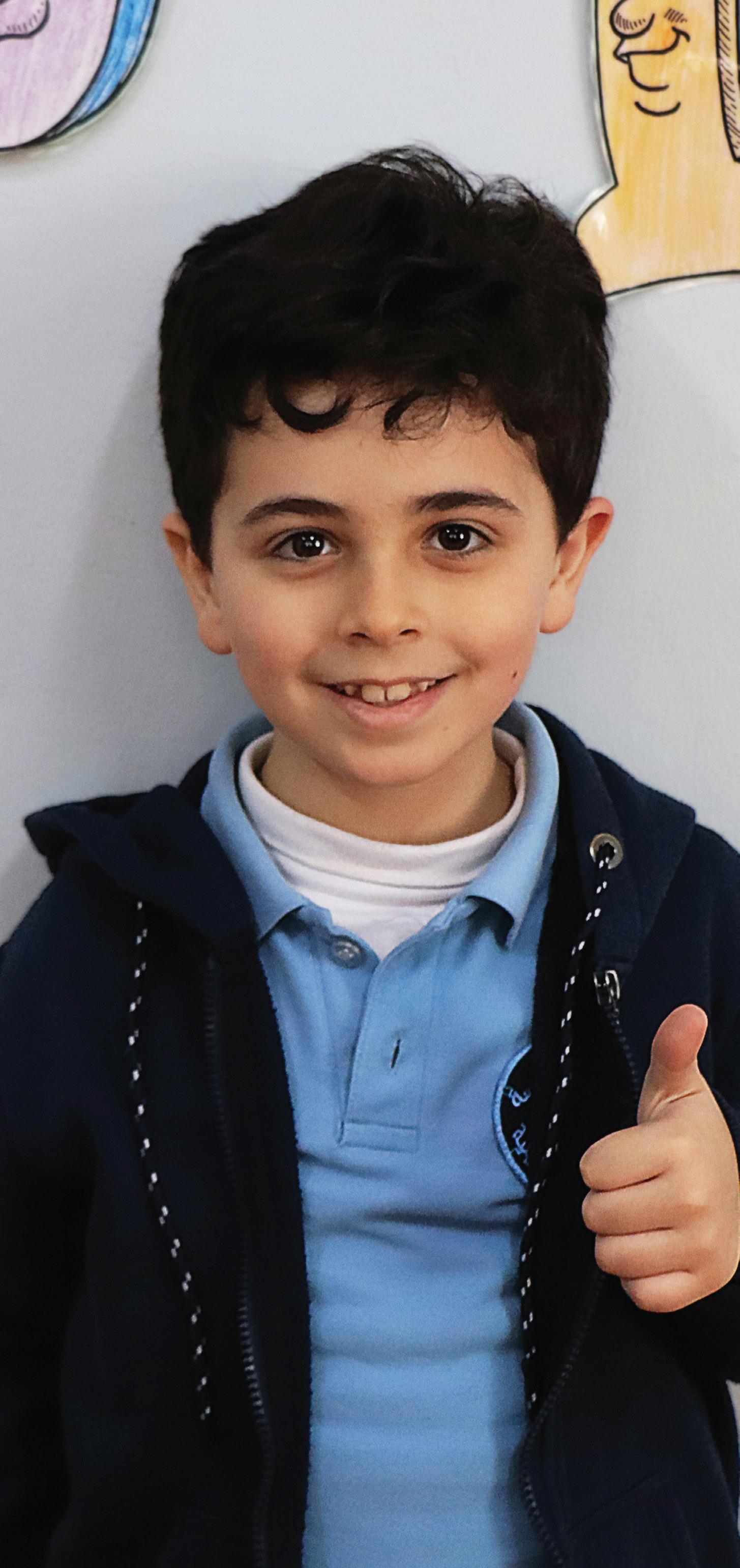
Following the example of Jesus, Nazarene Compassionate Ministries partners with local congregations around the world to clothe, shelter, feed, heal, educate, and live in solidarity with those who suffer under oppression, injustice, violence, poverty, hunger, and disease. NCM exists in and through the Church of the Nazarene to proclaim the gospel to all people in word and deed.
17001 Prairie Star Pkwy, Lenexa, KS 66220 (800) 310-6362, info@ncm.org
Lenexa, KS 66220 QUESTIONS?
Unless otherwise indicated, all
are from the New Revised Standard Version (NRSV) of the Bible, copyright 1989 by Division of Christian Education of the National Council of Churches of Christ in the U.S.A. Used by permission. All rights reserved.
NCM MAGAZINE GIVE THE GIFT OF SPONSORSHIP AGAIN AND AGAIN. 866-273-2549 INFO@NAZARENEFOUNDATION.ORG WWW.NAZARENEFOUNDATION.ORG For more information on Child Sponsorship Endowments, which sponsor children in perpetuity, contact the Church of the Nazarene Foundation at
NAZARENE COMPASSIONATE MINISTRIES
Design | RUCKUS GROUP
A FREE SUBSCRIPTION
Magazine
FOR
visit ncm.org/magazine SUBSCRIPTION CHANGES email info@ncm.org or write to NCM Magazine, 17001 Prairie Star Pkwy,
COMMENTS? email info@ncm.org
Scripture quotations
2022 // ISSUE 2
Cover Photo | LAUREN SNODGRASS
Nazarene centers minister to survivors of human trafficking in the Democratic Republic of the Congo.
In Kenya, one woman realized she could help girls attend school by providing sanitary products.
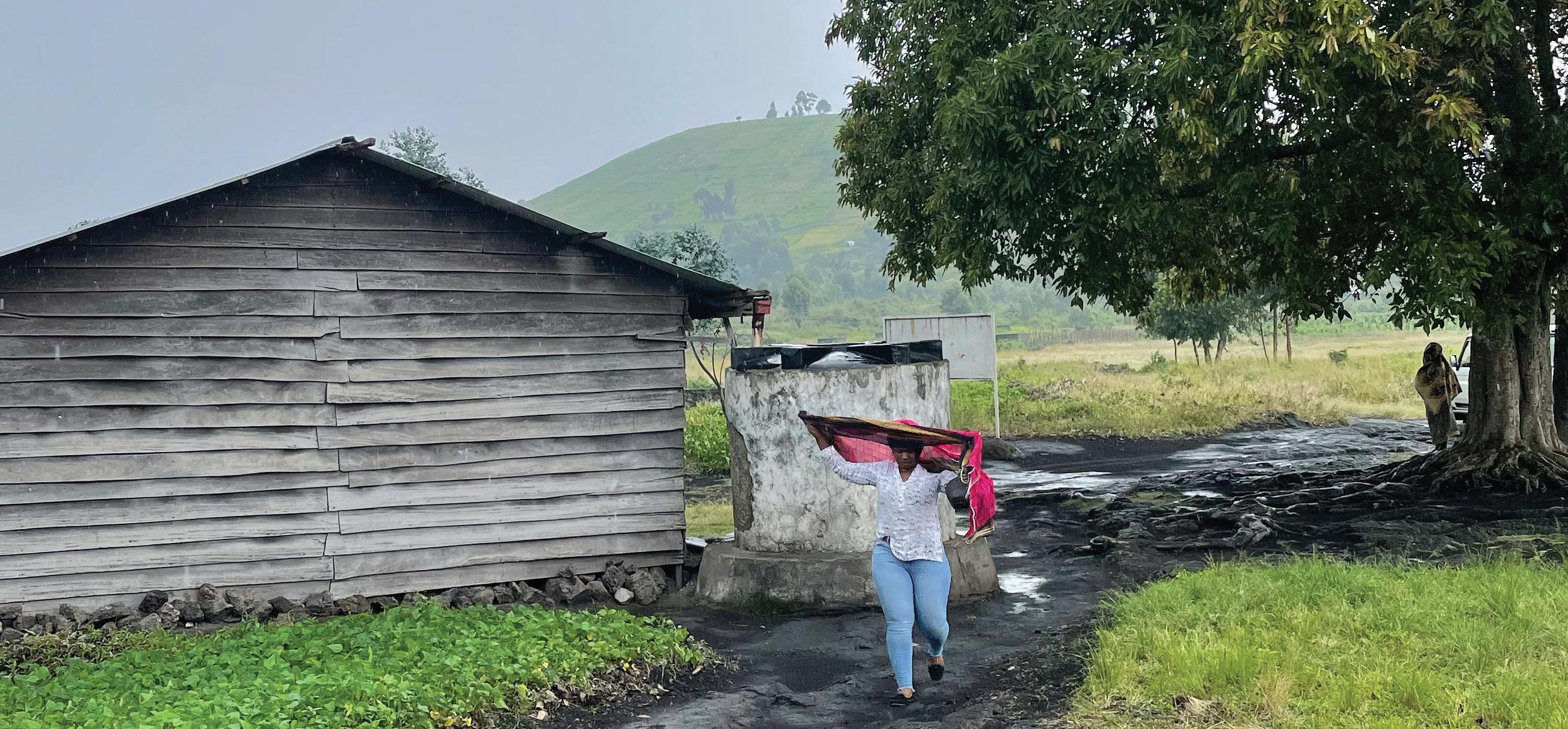

Nazarene schools in Jordan put compassion into their curriculum.
church in Egypt opens the door to economic empowerment for people who are vulnerable.

3 NCM.ORG
HOPE & DIGNITY | P.12
One
In
A COMMUNITY FOR KIDS
ONE MERCY | P.24 WEAVING FAMILIES TOGETHER | P.26 CONNECTION POINTS | P.5 VOICES | P.32 12 GO DEEPER | P.33 SNAPSHOT | P.34 CONTENTS TABLE of TABLE OF CONTENTS DEPARTMENTS 20 18 MINISTRY IN THE UNKNOWN | P.28 Learning how to minister to a scattered church in the face of war in Ukraine. FEATURES
FOR
Guatemala, a new ministry cares for migrants by teaching weaving and small business skills.
| P.20
NAZARENE
SHE | P.18
"Little children, I am with you only a little longer. You will look for me, and as I said to the Jews so now I say to you, ‘Where I am going, you cannot come.’ I give you a new commandment, that you love one another. Just as I have loved you, you also should love one another. By this everyone will know that you are my disciples, if you have love for one another.”
John 13: 33-35
LIFELONG PURSUIT OF GOD’S LOVE
By Nell Becker Sweeden
One of the most simple and profound aspects of God’s faithfulness is found in the word love. Love shows up in Scripture when describing both who God is and how God acts in the world on behalf of God’s covenant people. Love is embodied in Jesus’ incarnation, life, death, and resurrection, and it is His call to His disciples.
The Gospel of John talks about love in reference to Jesus returning to the Father and in Jesus’ love for His own in the world (John 13:1). In this passage, as a gesture of selfless love, Jesus takes the form of a servant and washes His disciples’ feet, even as He knows of impending betrayals (John 13:2-5). After Jesus goes on with His teachings, He then leaves His disciples with the statement: Just as I have loved you, you also should love one another (v. 34).
Does it really come down to that simple command—to love? Yes. There also lies the hard part: how to love in all circumstances. The real challenge of faithfulness to God is in how we live out God’s love for the world and express it in our daily lives. Love takes on many shapes and forms in a community through the participation of its members. How do we love our neighbors when our neighbors may not be very lovable, or when their situations seem insurmountable? How we love, especially and precisely then, is where we really begin to lean into what it means to be a Jesus follower.
Of course, what we know in fact is harder in practice. Jesus’ own life and death are further testimony of this. Jesus, as the embodiment of God's
love for the world, poured Himself out even when it meant suffering and humiliation, betrayal and death. This simple command “to love as I have loved you,” is completely countercultural and—truth be told—quite overwhelming. The reality is that Jesus’ call to love is hard work, and it takes all of who we are as humans. And yet, the equally radical promise is that this kind of love reflects God’s love for us. And it will change the world.
Following the two central commands to love God and neighbor is truly a lifelong pursuit. And yet, as we show up, God’s love and grace shows up, too. In the following pages, you will encounter beautiful, laborfilled expressions of what it means to show up—to love God and neighbor in all sorts of circumstances.
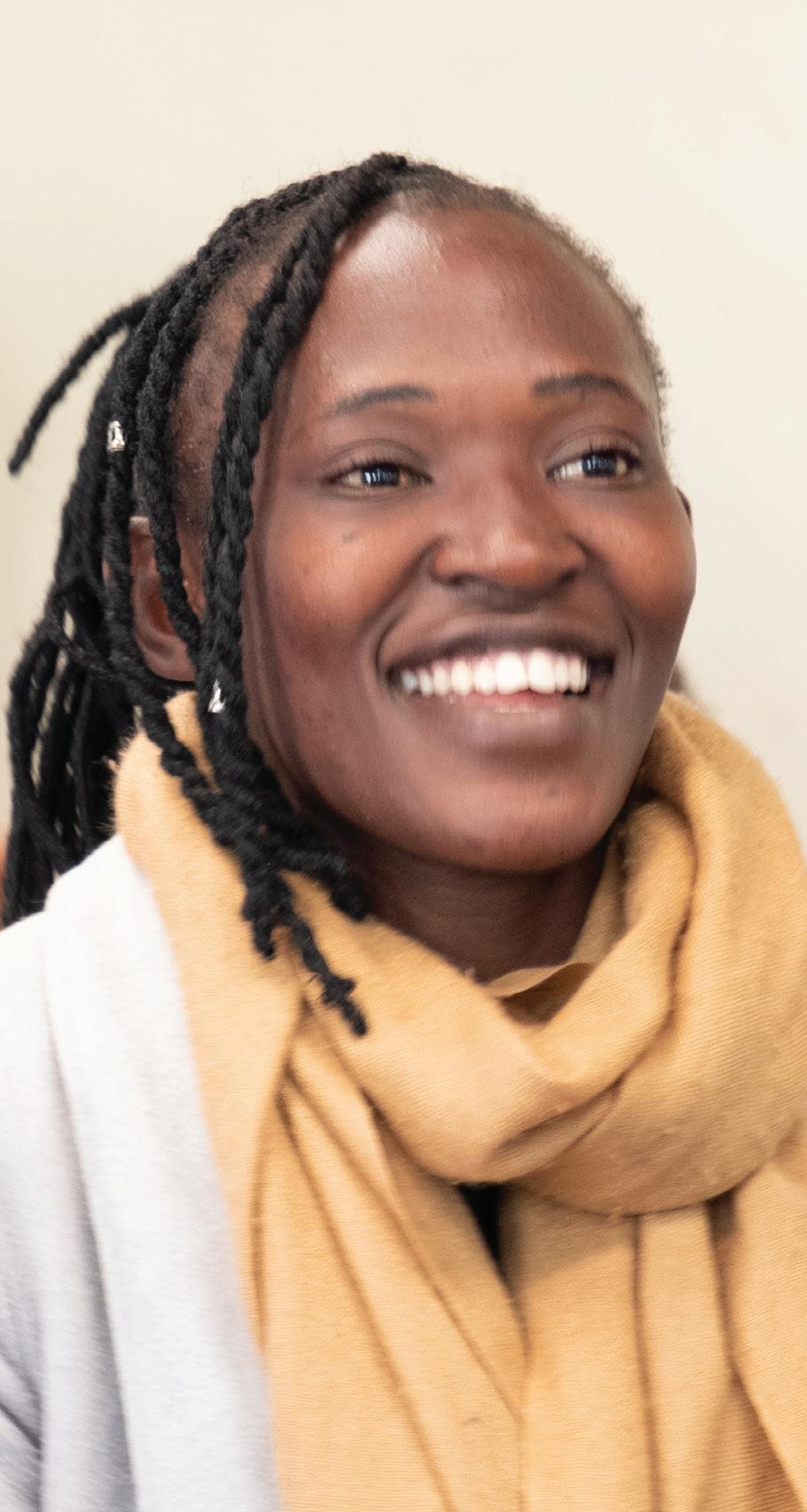
Some in these stories are following in Jesus' footsteps, sowing seeds of love at great risk to their lives. Others endure how to love through many trials and much suffering. All of these faithful servants, through the creative power of the Holy Spirit, are seeking and finding new pathways to express a tangible love for those enduring desperate circumstances— physical abuse, neglect, economic crisis, war. Their love is motivated by the love of Jesus and following His way in the world. It is not an easy road, but one full of grace and hope. What an amazing testimony to the love of God for the world.
For as Jesus said: "By this everyone will know that you are my disciples, if you have love for one another" (John 13: 35). To God be the glory.
4 2022 // ISSUE 2
OPENING NOTES
CONNECTION POINTS
holistic child development
WHAT WAS SOWN
A new children’s ministry in Indonesia hopes for the future
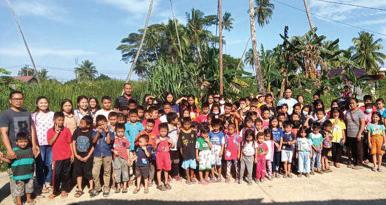
 By Roni Gunawan, NCM Coordinator Sealands Photos courtesy of NCM Sealands
By Roni Gunawan, NCM Coordinator Sealands Photos courtesy of NCM Sealands
On the outermost edge of Indonesia sits an island called Nias, a land that has suffered various blows from many natural disasters.
Nias Island is part of the Eurasian plate that collides with the India-Australia plate. As a result of this, earthquakes are a regular occurrence. One of the major disasters that occurred was a magnitude 8.7 earthquake on March 28, 2005, only three months after a different earthquake and massive tsunami killed hundreds of thousands of people in Southeast Asia. At that time, Nazarene Compassionate Ministries became involved by sending a disaster response team to distribute aid for short-term relief as well as developing a long-term ministry to children who were victims of disasters.

Seventeen years have passed since the disaster occurred. Since then, what has God done through the ministry of NCM in Nias? Remarkable things. A large number of young people from the NCM efforts in Nias became students at the Indonesian Nazarene Theological College (INTC). Through INTC's ministry, some of them have become pastors and leaders. Three local churches on Nias and neighboring islands are still growing today are a result of the initial NCM ministry. It turns out that in all things, truly God brings good; even in catastrophic situations, God is still at work. What was sown 17 years ago is producing the harvest we are seeing today.
Since the children’s ministry was originally part of long-term disaster response, it eventually was phased out. However, God did not stop working
in the lives of those who were served in those early years. A year and a half ago, God created an opportunity to restart the holistic child development ministry on Nias, and around 40 children regularly participate. The need remains.

Today, a large number of children on Nias don’t have access to a high-quality education. The new ministry will create academic growth through supplemental learning assistance. The goal has always been holistic care—helping children grow spiritually, educationally, emotionally, and physically. Tutoring for children is also a way to build relationships in the local community. In that way, the five staff members on Nias can visit, pray, and give counsel to the parents of these children. In a small group, people hold regular Sunday worship.
It is a joy to see how God has used past ministry efforts to produce long term results. Through God’s grace, what is sown today will be reaped in the future, just as it was 17 years ago.
5 NCM.ORG
global focus
BUILDING STRONG RELATIONSHIPS IN ZAMBIA
 Reporting by Moses Sikabeta, NCM in Zambia Photos courtesy of Moses Sikabeta
Reporting by Moses Sikabeta, NCM in Zambia Photos courtesy of Moses Sikabeta
The volunteers who regularly make the rounds between villages have a challenge set before them. They are visiting people to talk to them about HIV and AIDS, issues that will mean combatting a deeply-rooted stigma. While much progress has been made to combat HIV and AIDS in Zambia over the last decade, it is still a common reality for too many people. Often, women and girls, who have less autonomy due to culturally-enforced

Several Nazarene churches wanted to do something to help; together, they decided to start by talking to married couples in the community. Counselors would work with couples, and volunteers would connect people to HIV and AIDS testing services. This education and support is done with the goal of strengthening families and encouraging them to rethink gender norms to empower women.

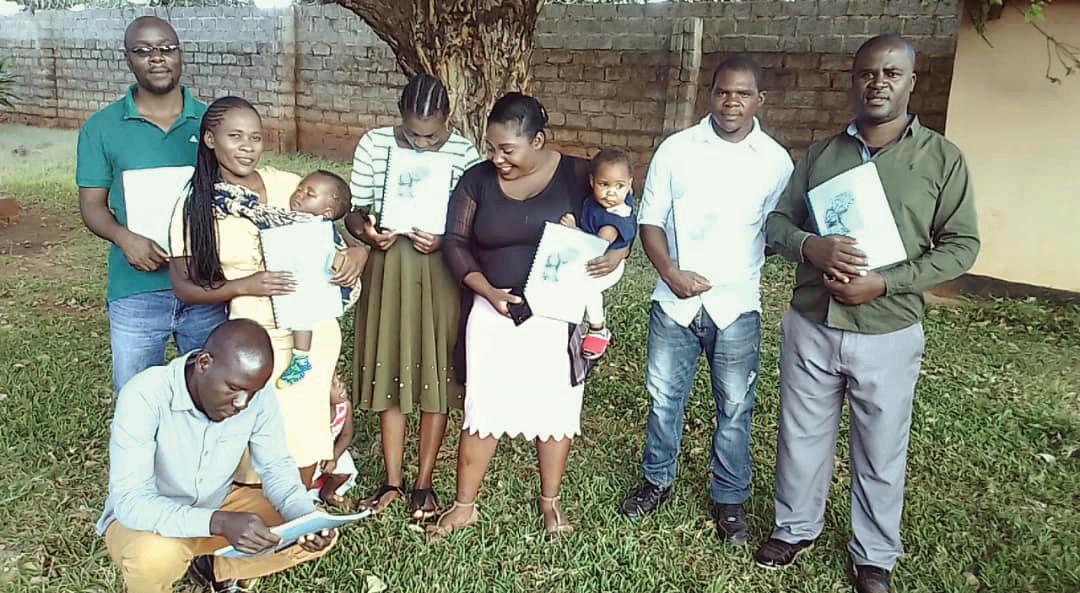
The ministry still faces challenges—there is still a deeply engrained hesitance to be tested, and many people see it as unnecessary. But there are stories of hope, too. People are discovering that the church is a safe space to go for help and guidance.
Alice, who participated in a training at a Nazarene church with her husband, explained that they had no template for becoming a strong married couple. They fell into a pattern that excluded her from any decision making. Learning communication techniques is helping them build a stronger marriage.
“When we learned about friendship in marriage, I saw that my husband started treating me as a friend and started sharing his thoughts with me,” Alice says.
norms, bear the brunt of both the illness and the stigma. While the government provides free medication and testing services, many people fear stigma, rejection, or unknown treatments.
6 2022 // ISSUE 2
CONNECTION POINTS
“WHEN WE LEARNED ABOUT FRIENDSHIP IN MARRIAGE, I SAW THAT MY HUSBAND STARTED TREATING ME AS A FRIEND AND STARTED SHARING HIS THOUGHTS WITH ME,”
BARRIERS BREAKING DOWN
CULTIVATING ONENESS IN CHRIST THROUGH ENGLISH LANGUAGE CLASSES
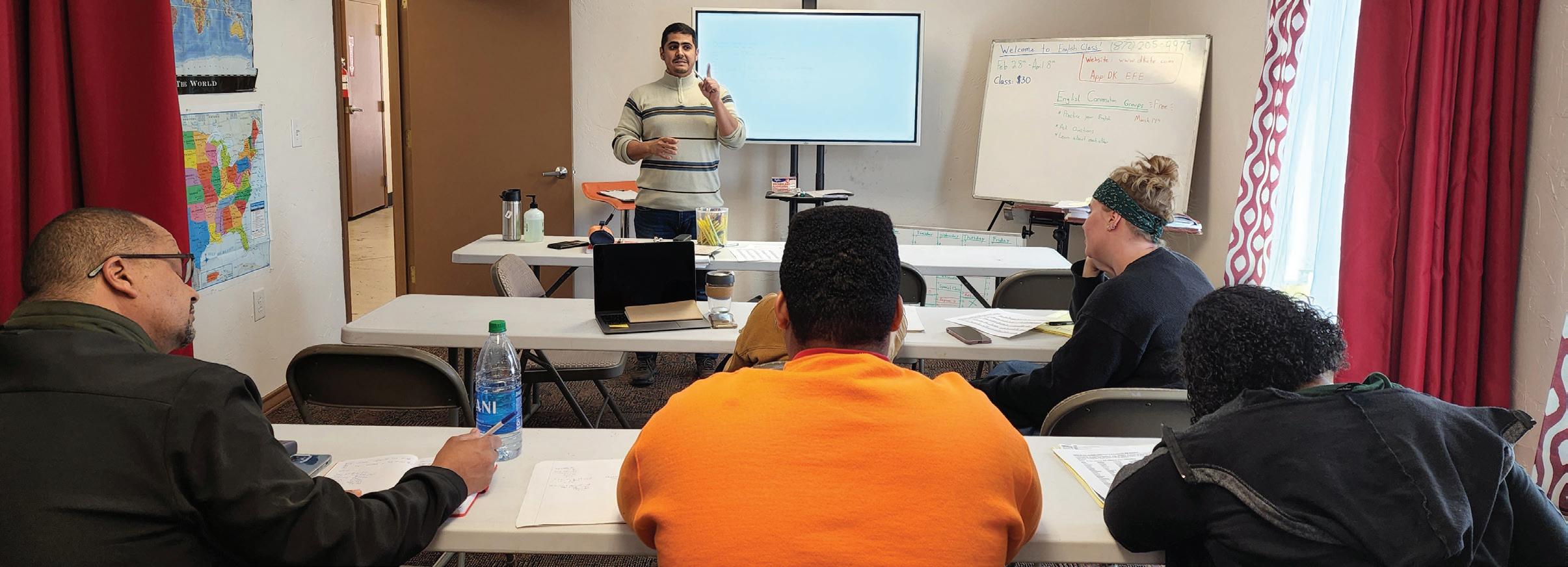

 By Denise and Phil Anderson, Cactus Nazarene Ministry Center Photos courtesy of Cactus Nazarene Ministries
By Denise and Phil Anderson, Cactus Nazarene Ministry Center Photos courtesy of Cactus Nazarene Ministries
Cactus, Texas, is a small town of about 3,100 people, a large number of whom are living as refugees or immigrants. The town is truly multicultural, with people from North and Central African countries, Southeast Asia, the Middle East, Central and South America, the Caribbean, and Mexico.
In fact, it is this population of Cactus that encouraged the West Texas District Church of the Nazarene to start a compassionate ministry here. With so many different ethnicities in one small town, the socioeconomic, cultural, linguistic, and religious barriers have caused significant segregation, especially among those who are new to the area. It is this diversity and this segregation that inspired us to come together to build a community that is culturally diverse, trusting, loving, and mindful of one another. Cactus Nazarene Ministry Center (CNMC) was born.
Through the ministry, the desire is that each of us would grow to understand others better—that those in the classes would not simply learn a new language but come to realize the things we share. While learning English is part of job training and access, many students have also come to realize the benefits of simply being in class—learning a common language and getting to know one another. It also helps parents support their children academically, since the children’s homework is in English.
“We are now friends because we come to class together,” one student said. “I also am able to find more people to get to know from other countries at work, or at shops, and we can communicate in English if both people can speak it well.”
One way we have found to foster community is through offering English as a Second Language (ESL) classes, which have been part of CNMC’s ministry since the beginning. Students from the community join a class based on their language level, and conversation practice in the advanced classes helps pique the students’ interest to learn more about one another. From the very first class, each student is encouraged to find a partner who can speak English with them.
Some of the staff have been recruited to sit and have one-on-one conversations, which often include asking about the student’s culture, language, family, and current life situations. The cultural diversity of our staff and the diversity of our students make this one-on-one time incredibly rich. Elsowar, a student from Sudan, explains that the very act of conversing helps build confidence and relationships.
“You can understand what they are talking about,” he explains. “Just being able to communicate with other people can help you develop relationships.”
Teaching English is one of the holistic ministries we focus on as we serve the many cultures of Cactus. In the coming months, Cactus International Church, a church plant that will create another safe and inviting environment that promotes oneness, will open its doors. The new church will invite the many cultures of Cactus to be, live, and worship together.
“I am able to share about my culture with others, including the food and how I live,” another student shared. “If you have a common language, then there is good listening, good talking, good meeting with other people.”
7 NCM.ORG
“I AM ABLE TO SHARE ABOUT MY CULTURE WITH OTHERS, INCLUDING THE FOOD AND HOW I LIVE,”
Work Meaningful
have loved hairdressing a lot, but I didn’t have the resources to study [it],” Ayda explains.

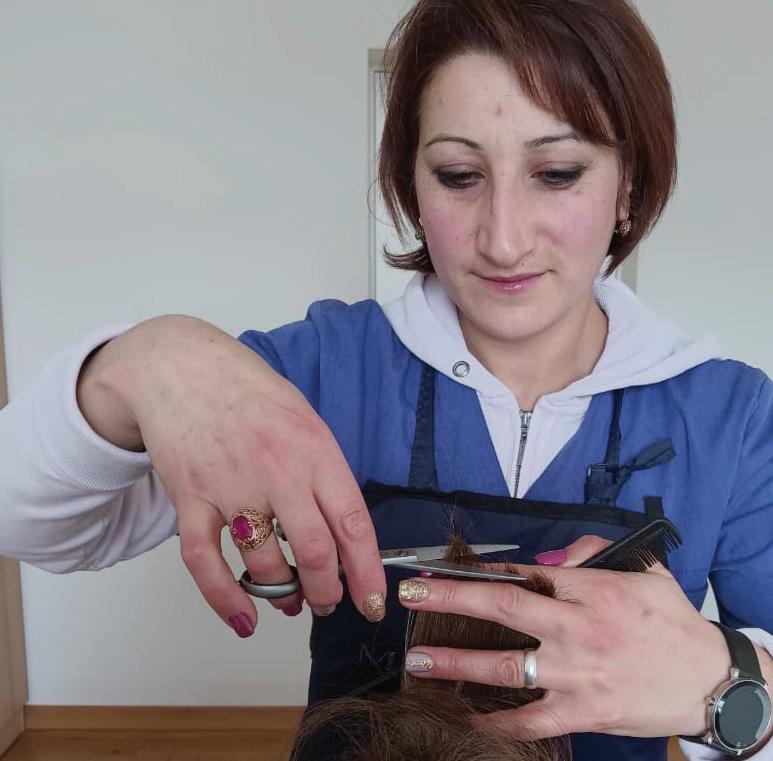
A single mother of two children, Ayda was supporting the family through what they could produce on a very small piece of land in their native Armenia. She and her children attend a Nazarene church where her children also attend Vacation Bible School and a Kids Club (a child development center where they receive academic, social, and spiritual support).
Ayda is part of a new Nazarene ministry in Armenia through which people can learn job skills and small business training. Classes are varied, including hairdressing, cooking, baking, learning foreign languages, and more. The training is open to anyone struggling with food insecurity. Many participants have migrated from places
8 2022 // ISSUE 2
8 2019 // ISSUE 1
FIGHTING HUNGER THROUGH VOCATIONAL TRAINING CLASSES IN ARMENIA
One church partners with community members to teach business skills.
CONNECTION POINTS
REPORTING BY RITA LAO PHOTOS COURTESY OF NCM IN ARMENIA
“ I
like Lebanon, where they weren’t able to earn a living in the midst of the country’s financial crisis.
“When the pastor approached me and presented the project to me, I understood that it was an answer to prayers,” Ayda says.
After participating in a hairdressing course, Ayda set up a salon in a corner of her home, welcoming clients regularly. “My next dream is to have my own salon,” she shares.
Varditer was also part of one of the initial hairdressing classes. She lives with her husband, children, and mother-in-law—and she works at an elderly home as a caretaker and a hairdresser, a job she wouldn’t have been able to get before the classes. “I was given priority to be employed by the senior home because I also have hairdressing skills,” she explains.
While job skills training is the key focus of the ministry, it is closely aligned with Kids Clubs, food
security projects, and other organizations, including the Red Cross, addressing the needs in Armenia. The ministry leaders also hold regular meetings with people in each area where they work. This allows

them to assess the needs, developing the classes and training based on people’s learning interests.
The classes demonstrate the potential for small-scale economic development projects in Armenia, including the ways the church can be an advocate and support for vulnerable people.
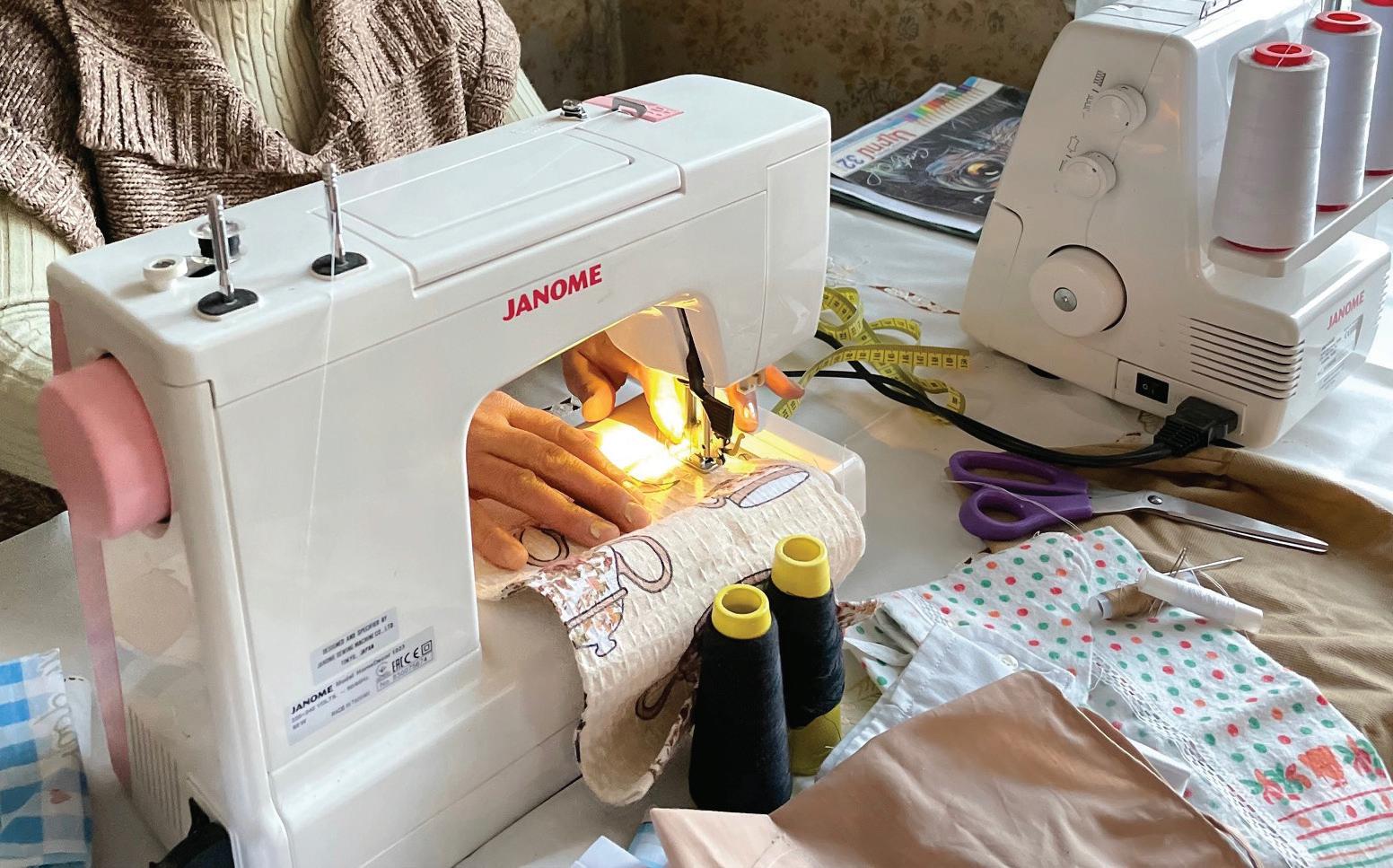

9 NCM.ORG 9 NCM.ORG
Jobs skills training opens doors for women to pursue opportunities for entrepreneurship.
“When the pastor approached me and presented the project to me, I understood that it was an answer to prayers.”
Q&A
WHAT DOES LIVING COMPASSIONATELY MEAN TO YOU?
“Living a compassionate life, for me, means imitating Jesus, which is the willingness to step down from my position and rights to be with those who suffer, cry with those who cry, and share life and hope with them.”
- Roni Gunawan, story on page 5
-
“To live with compassion is a life led by acts of hospitality, generosity, and love towards your fellow person or person in difficulty. To live with compassion would be a life driven by love of neighbor.”
 - Didas
- Didas
Bahunga Kwabo, story on page 12
“It's the love of God in Jesus Christ that is my ultimate motivation for the acts of compassion I engage in. All people are made in the image of God, with full dignity and inherent rights, to be treated as such in carrying out this work. I am participating with God.”
Maureen Ochola, story on page 18
10 2022 // ISSUE 2 CONNECTION POINTS

11 NCM.ORG STARTS WITH YOU Community-wide change SPONSORING A CHILD TODAY COULD IMPACT A WHOLE COMMUNITY. Learn more via ncm.org/sponsor, cs@ncm.org, or 800.310.6362.
Dignity Hope &

A DISTRICT IN THE DRC IS CHANGING THE STORY FOR SURVIVORS OF HUMAN TRAFFICKING
 BY GINA POTTENGER PHOTOS BY LAUREN SNODGRASS
BY GINA POTTENGER PHOTOS BY LAUREN SNODGRASS
Listening centers create space for survivors of human trafficking to find community and hope for the future.
Among other support, Listening Centers provide education in self defense and kidnapping awareness.
Please note that this story contains information about human trafficking and abuse.
Élisabeth* says the worst day of her life was when she accepted a ride home from school.
“I will never forget that bad day, which almost put an end to my life and dreams,” she explained.
The ride was a pretense to kidnap Élisabeth into sexual slavery. It took a month of intense negotiations before her family obtained her release. By then, the young woman was pregnant.
Ostracized by her community for the stigma of being an unwed mother and without an education or job skills, Élisabeth and her daughter would have had no option but to spend life in poverty if she hadn’t found unconditional love, healing, and practical support at a Nazarene listening center, a space where people can go to speak with trained psychologists.
ONE STORY OF TOO MANY
If only Élisabeth’s tragedy were unique. But the Democratic Republic of the Congo (DRC) has long held the horrific epithet, “Rape Capital of the World.”
The Central African nation has been destabilized by armed conflict ever since militants were pushed into the eastern part of the DRC from Rwanda, following the latter’s 1996 civil war and genocide. After the 2001 assassination of Dictator Joseph Mobutu, the DRC has experienced the world’s longest and bloodiest civil war since World War II—more than two decades of sustained violence.
In the DRC, especially, rape and kidnapping are political weapons wielded against children, both women and men, by both indigenous and foreign militias, as well as a way to extort families for ransom.

But sexual violence in the DRC extends far beyond politics. Wherever instability traps people in extreme poverty, those in poverty are easy targets for human traffickers. According to the World Bank, DRC is one of the five poorest countries in the world; 73 percent of Congolese live on less than $1.90 USD per day. Traffickers kidnap the vulnerable into forced labor and prostitution or into their militias. After escaping, survivors experience long-term mental health suffering, which often affects their physical health as well.
“I'm afraid,” said one survivor at a listening center. “I no longer trust a man carrying a weapon or in military uniform. Today, we are victims of psychosomatic illnesses such as hypertension and other physical disorders.”
13 NCM.ORG
Sexual violence and trafficking also tear apart communities; when survivors return home pregnant, like Élisabeth, they are rejected by their friends and families, further isolating them when they most need love and support.
LISTENING TO HEAL
Élisabeth’s schooling was interrupted when she became pregnant and decided to keep and raise her child. Without an education, her hope for finding a good job to provide for herself and her daughter was shattered.
Then, Élisabeth found a Nazarene listening center. Listening centers are an innovative concept of local Nazarenes who saw far too many of their friends and neighbors fall victim to trafficking and sexual violence.
“We said, 'Let us do something to teach people how to avoid being kidnapped in Goma,’” explained Didas Bahunga Kwabo, the NCM coordinator in North Central Kivu. “That is why we said we should have a listening center.”
The centers are balanced on four pillars: prevention, protection, prosecution, and partnership.
• Prevention: The staff teach people in the community how to avoid becoming victims, along with self-defense training.
• Protection: The staff provide safe and private spaces where trauma survivors experience acceptance and healing, receive medical and mental health treatment, spiritual support, and learn job skills.
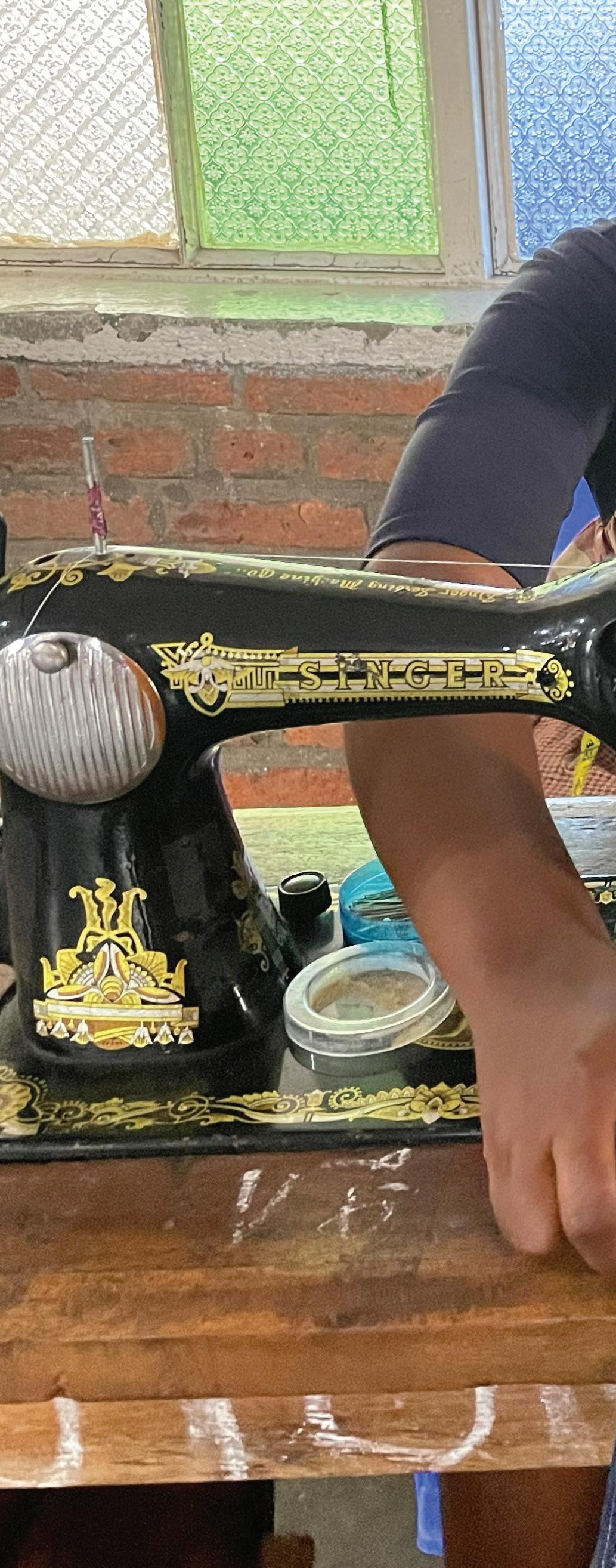
• Prosecution: The teams connect survivors with legal assistance as they pursue justice.
• Partnership: The centers partner with government ministries in anti-trafficking campaigns as well as advising and supporting survivors. They also partner with Christian organizations and other institutions, such as hospitals, in various efforts to serve survivors.
“During trafficking, the victims are deprived of their dignity, freedom, and movement,” wrote Didas. “But [here] they feel the warmth of being accompanied, assisted medically, psychologically, and spiritually.”
RECLAIMING A SENSE OF AGENCY
However, it’s not enough to listen to and love survivors unconditionally, Didas said. They must reclaim their own dignity and agency. Equipping them
14 2022 // ISSUE 2
The women hope their economic stability will be far-reaching, impacting their community and future generations.
“I have gone from being hopeless to having full confidence by God’s grace.”
with new skills can meet that need.
The staff interviewed numerous survivors, mostly women, to ask what they needed most. Many requested sewing classes so that they could become self-sufficient and provide for their families. Others pointed out that learning to read and write should come first.
“People who don’t know how to read and write don’t know their rights and they don’t know how to fight for their rights,” pointed out one participant.
The center now offers sewing and literacy workshops. Élisabeth learned sewing and catering, earning a certification that will help her obtain a job.
Survivors further develop their confidence by teaching others the new skills they are learning.
“God has given me this knowledge, and I feel joy to give this knowledge to others,” said Marie, who attended the sewing classes at the center in Goma.

“It is integrating them into society so they don't feel less than others; they feel a part of the society,” Didas said.
CHURCHES HAVE FOUND THEIR FULL CALLING
Before launching the centers, local churches were more narrowly focused on preaching the gospel. But the new listening centers took them “from the pulpit to the margins.” Walking alongside survivors has “awakened” them from passivity in the face of seemingly insurmountable social evils to activity. The listening centers, Didas explained, are helping the church to live out Jesus’ deep and abiding love for the “the neglected, abandoned, and forgotten … those who have been abused and the rejected in the society.”
“I am grateful to the Church of the Nazarene for the assistance I got after being traumatized by the kidnappers,” said one survivor. “I have gone from being hopeless to having full confidence by God’s grace.”
Survivors from a few centers have gained the confidence and healing to form two choirs who sing of how Jesus has turned their darkness into light. Their testimonies are spreading hope in their communities.
Although these survivors have lived through a waking nightmare, they are finding it possible to dream of a better future once again.
ADVOCATING FOR OTHERS
Laurène dreams of becoming a journalist who will amplify the issue of trafficking and give a voice to survivors. That’s because she’s a survivor, too.
After Laurène’s parents divorced, her uncle took over raising her. But, as a teacher, he struggled to earn enough to support and protect her.
Laurène was in the 6th grade when she was kidnapped and smuggled out of the country. Her
15 NCM.ORG
uncle went into deep debt to locate and bring her home. Thankfully, he succeeded. But their danger wasn’t over yet.
“Survivors of exploitation, human trafficking, and kidnapping are often exposed to repeated attacks by the same actors,” Laurène explained.
Rescuing his niece had made him a target, and he was forced to flee for his life.
Without his protection, Laurène’s community ostracized her. She gave up her dream of attending university because it was a struggle merely to supply her own daily needs.
That’s where a listening center stepped in. The staff not only treated her as someone with value, they connected her with government authorities and organizations who could help. Further, the center covered two years of her tuition to attend university.
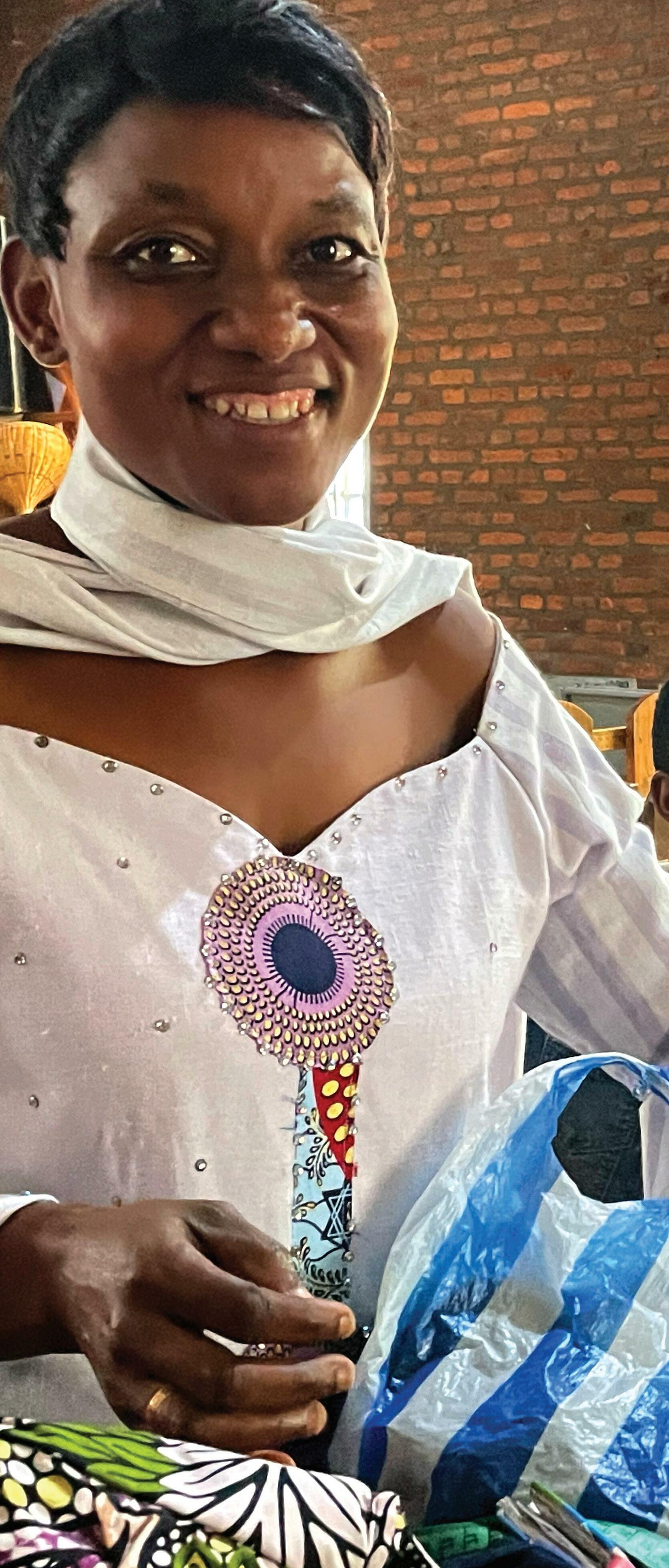
“The hope I have at the moment is to become a female journalist—a woman able to process and analyze the difficult situations that young victims of human trafficking have to endure,” she shared.
OPENING DOORS TO NEW LIFE
Dominique and her husband were unskilled farmers when the war surged into their area. The militants captured Dominique and killed her husband. She was held captive in the bush for more than three months, until the army set her free.
Now a grieving widow, Dominique returned home to face another tragedy: stigmatization and rejection by her own community. With nothing left to lose, Dominique set off to reinvent herself in the anonymity of the large eastern city of Goma. She found a listening center, where she took vocational training, becoming so proficient at sewing that she is now teaching the skill to others.
“Now that I am useful to the community, God has opened the door for my new life,” Dominique said. “I found a lovely new husband who is supportive. Together we have two children plus the one I have before, which means I have three children.
“My life is a living testimony of God’s grace in the church family where love is preached and lived, for sure,” she added.
*Names of participants are changed for safety.
Job skills training opens doors for survivors that would otherwise be closed.
“God has given me this knowledge, and I feel joy to give this knowledge to others.”
In addition to learning marketable skills, women can also recieve emotional and spiritual support.
The Bulengo Listening Center
Since 2017, the Bulengo Listening Center has been providing people with a space to address vocational, emotional, psychological, and spiritual struggles. The center is intentionally situated near a camp for people driven out of their villages by war. Originally started by a local Nazarene church, the center eventually became a district-wide initiative. There, people can participate in a literacy program as well as vocational training including sewing, carpentry, basket weaving, and plumbing. Then, they can put their skills into practice through a sponsored community-based microfinance program. The center also sponsors school fees, so young survivors can finish their education.
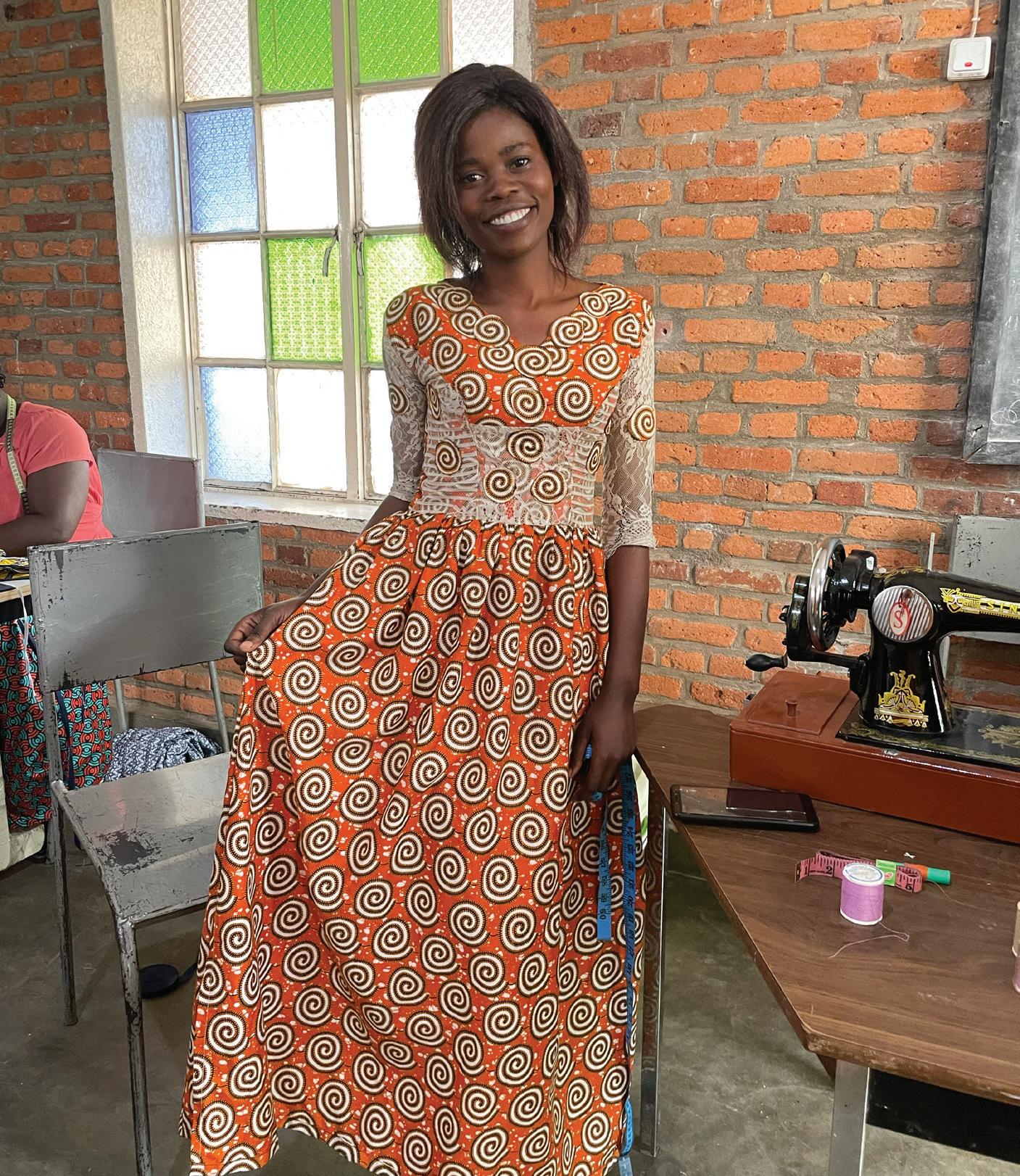
Challenges in the DRC
• About 13 million people lack adequate food.
• More than 1.3 million children under 5 are affected by severe acute malnutrition.

• About 12.8 million of 81 million people in the DRC need humanitarian assistance and protection, including 5.6 million children.
• More than 800,000 people from the DRC live in neighboring countries as refugees, and 4.5 million people are displaced within the country.
• An estimated 86% of 10-year-olds in DRC are in learning poverty
• Only 16.8 % of women have completed secondary school—about half of the rate of completion for men.
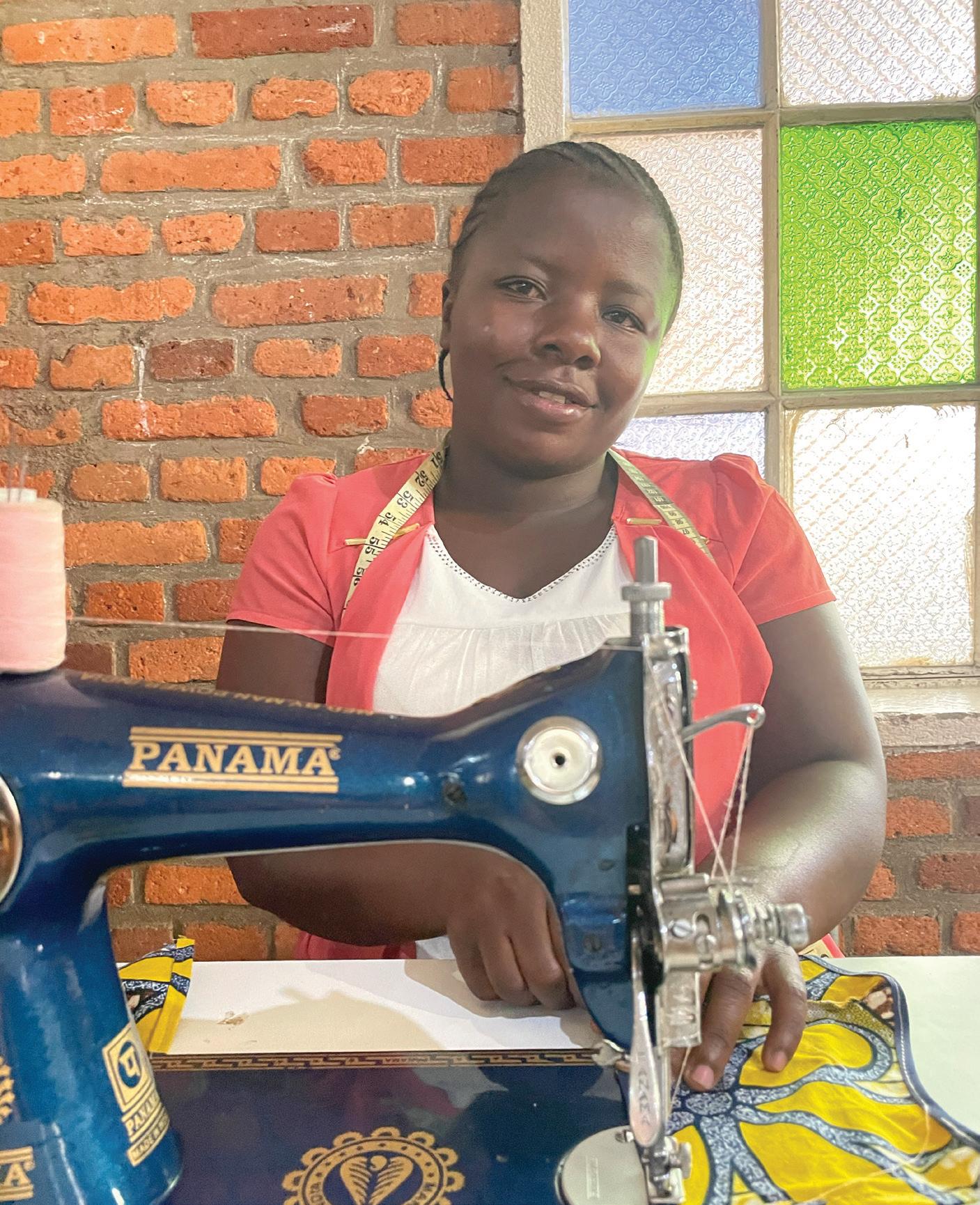
Source: World Relief, World Vision, and World Bank.
The centers communicate to survivors that they are valued and loved.
NAZARENE FOR SHE
A NAIROBI MINISTRY VALUES WOMEN AND GIRLS
BY LAUREN SNODGRASS PHOTOS BY BRANDON SIPES
Maureen Ochola smiles as girls fill the sanctuary of Kawangware Church of the Nazarene in Kenya. These young women have gathered for a special event that will provide information and tools to, in Maureen’s words, “retain their dignity and empower [them].”
“I needed to remind girls that they are not supposed to be limited by their conditions, and that they can dream and need to work hard to achieve it, if only they believe in themselves,” she adds.
Maureen and other members of this organization, Nazarene for She, begin to open boxes and walk around the room passing out small packages that hold the possibility of protection and empowerment for each girl present. Each package contains a month’s worth of sanitary towels. Without this distribution and the menstruation education Nazarene for She provides, many of these young women and girls would miss at least four days of school a month because they lack essential products. Some may use other alternatives, putting them at risk of infection, and others will go to great lengths to earn money to purchase hygienic sanitary products—not fully understanding the consequences.
RECOGNIZING DIGNITY AND POTENTIAL
Nazarene for She, operating out of Kawangware Church of the Nazarene, is located just west of Nairobi city in one of Kenya’s largest informal settlements. Kawangware is home to more than 290,000 residents, many of whom

are day laborers or own small businesses who use their limited resources to provide their children with necessities like food, clothing, and school supplies. Sanitary products become a luxury item, something that takes the backseat to food and shelter. Additionally, cultural stigmas mean menstruation and reproductive health are not commonly discussed, leaving girls ill-equipped to navigate puberty.
Maureen, founder of Nazarene for She, understands the struggle families and girls face in Kawangware, a place she grew up in and continues to call home.
“I live in a slum and see a lot of things happening in our community,” she says. “It was sad hearing a girl say since she cannot afford sanitary towels, she would exchange it [for] sex…I decided to involve myself.”
Maureen was inspired to start Nazarene for She, launching their first sanitary towel distribution in January of 2021.
“It was easy to judge someone and not hear their side first,” she explains. “It’s easier to find a solution for a problem, because now we look at the root cause.”
Under Maureen’s leadership, Nazarenes for She envisions “A world of menstrual dignity.” With each distribution, Nazarene for She provides young women with tools that enable them to remain in school as well as education on reproductive health, equipping them to “step into their potential.”
18 2022 // ISSUE 2
“IT WAS EASY TO JUDGE SOMEONE AND NOT HEAR THEIR SIDE FIRST.”
2022 // ISSUE 2 18
“We teach the girls about God and the love of Christ,” Maureen says. “We also teach them about hygiene and menstruation, and we empower them through talks.”
STORIES OF HOPE
Elizabeth is one of 300 young women who have benefited from the organization’s vision of creating a world of menstrual dignity. Now, she hopes to become a nurse and open a pharmacy.
“Nazarene for She has really made me gain confidence,” she shares. “Before, I had a low self-esteem. I think right now life is OK since Nazarene for She stepped in, and through that [I became] empowered.”
Maureen has also been intentional about educating and mobilizing the wider community. Christopher, a young student who serves as the Nazarene for She secretary, shares he became aware that girls were, “... dropping out of school, others became young mothers, and some were losing their dignity due to lack of sanitary towels.” He believes in the mission of the ministry, hoping to create an environment where girls feel safe and protected wherever they are. Beatrice Vice, also a member of the organization and local online radio host, chose to volunteer with the ministry because she was a beneficiary of a similar initiative.
“Nazarenes for She has helped me appreciate what I took for granted thinking of just material things,” Beatrice says. “I now have the desire, platform, and push to help girls in vulnerable communities.”
So far, Maureen and her team have held four distribution events at Kawangware church. They also canvas the neighborhoods in the settlement, passing out supplies and a good dose of encouragement. Maureen understands that this is more than giving out sanitary pads.



“Nazarene For She is a ministry, and we are [the] hands and feet of Christ,” she says.
Her hope in Christ enables her to have hope for the young women of Kawangware and the community at large. When asked what she desires for the future, she responds, “...to see girls retain their dignity and [be] empowered, because when they are empowered, our community will be inspired.”
19 NCM.ORG
“I NOW HAVE THE DESIRE, PLATFORM, AND PUSH TO HELP GIRLS IN VULNERABLE COMMUNITIES.”
“WHEN THEY ARE EMPOWERED, OUR COMMUNITY WILL BE INSPIRED.”
Women and girls learn about essential hygiene practices that lead to better health and quality of life.
By providing sanitary supplies, the ministry makes sure that girls are able to attend school uninterrupted.
NCM.ORG 19
Nazarenes for She shares encouragement in addition to educational and material resources.
A COMMUNITY FOR KIDS
NAZARENE SCHOOLS IN JORDAN CREATE SPACE FOR LOVE AND WELCOME

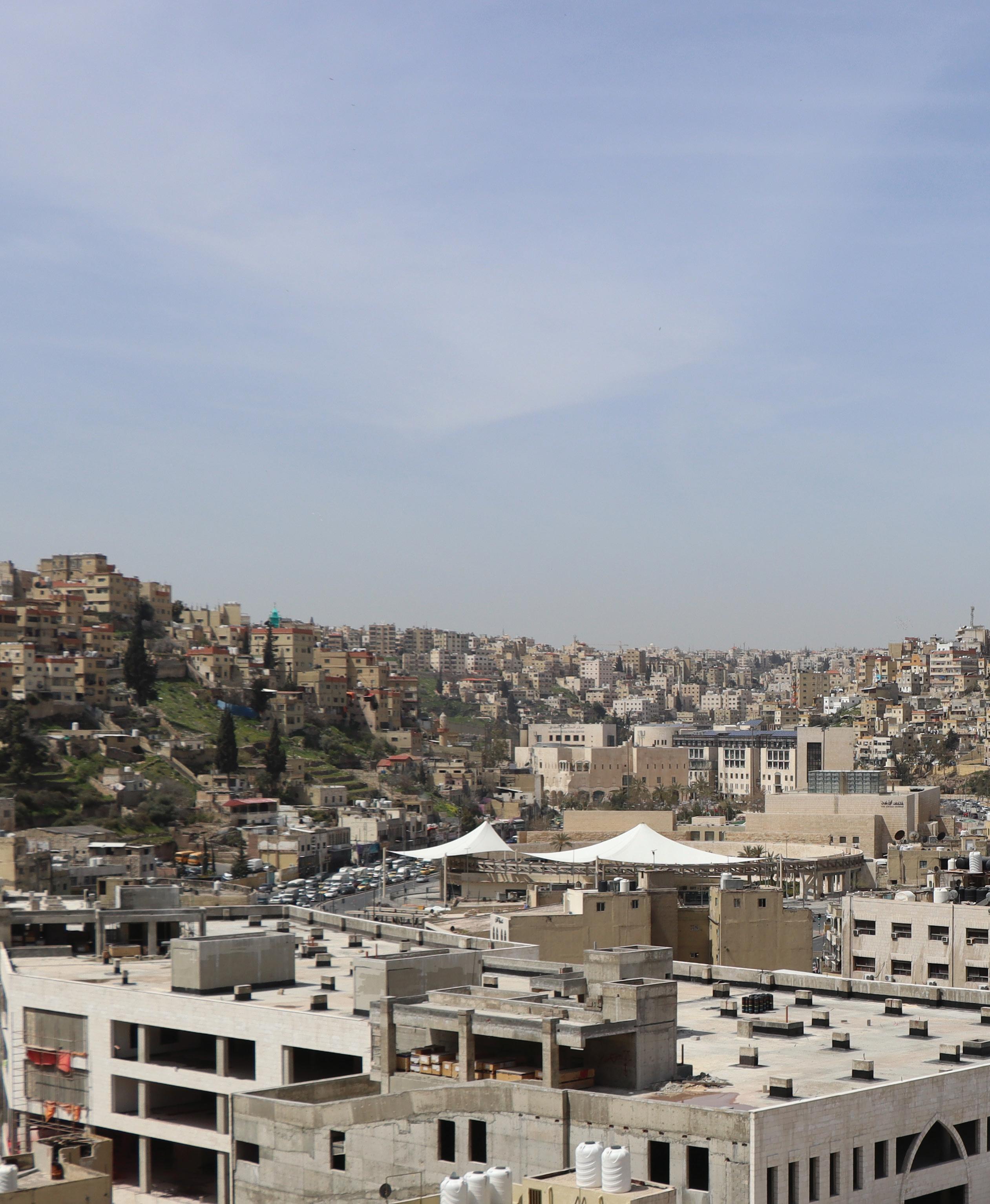
Sami* and his family fled a country nearby Jordan after experiencing extreme trauma and violence. When he arrived at one of the two Nazarene schools that have served students in Jordan for decades, he struggled with anger and couldn’t relate to the other students. But after months of consistent, trauma-informed care and support from teachers and students, he is learning to be a team player and build friendships of his own. “Now, we are so proud of him,” says Ms. Hanaa, his English teacher.
Around three hundred students attend the two schools, where the goal has always been to serve the children as well as possible. Some of the students, like Sami, are living as refugees or are facing extreme financial hardship. No matter what, children are welcomed and accepted. “First of all, this place it is for everybody,” Principal Layla says. “It gives a chance for [all children] to hear a message of love.”
*Children's names are changed for protection.
20 2022 // ISSUE 2
20 2022 // ISSUE 2
THE SCHOOLS IN JORDAN ORIGINALLY OPENED TO SERVE REFUGEES FROM ARMENIA, A MISSION THAT STILL SHAPES THEIR ETHOS OF COMPASSION.
PHOTOS BY CALLIE STEVENS


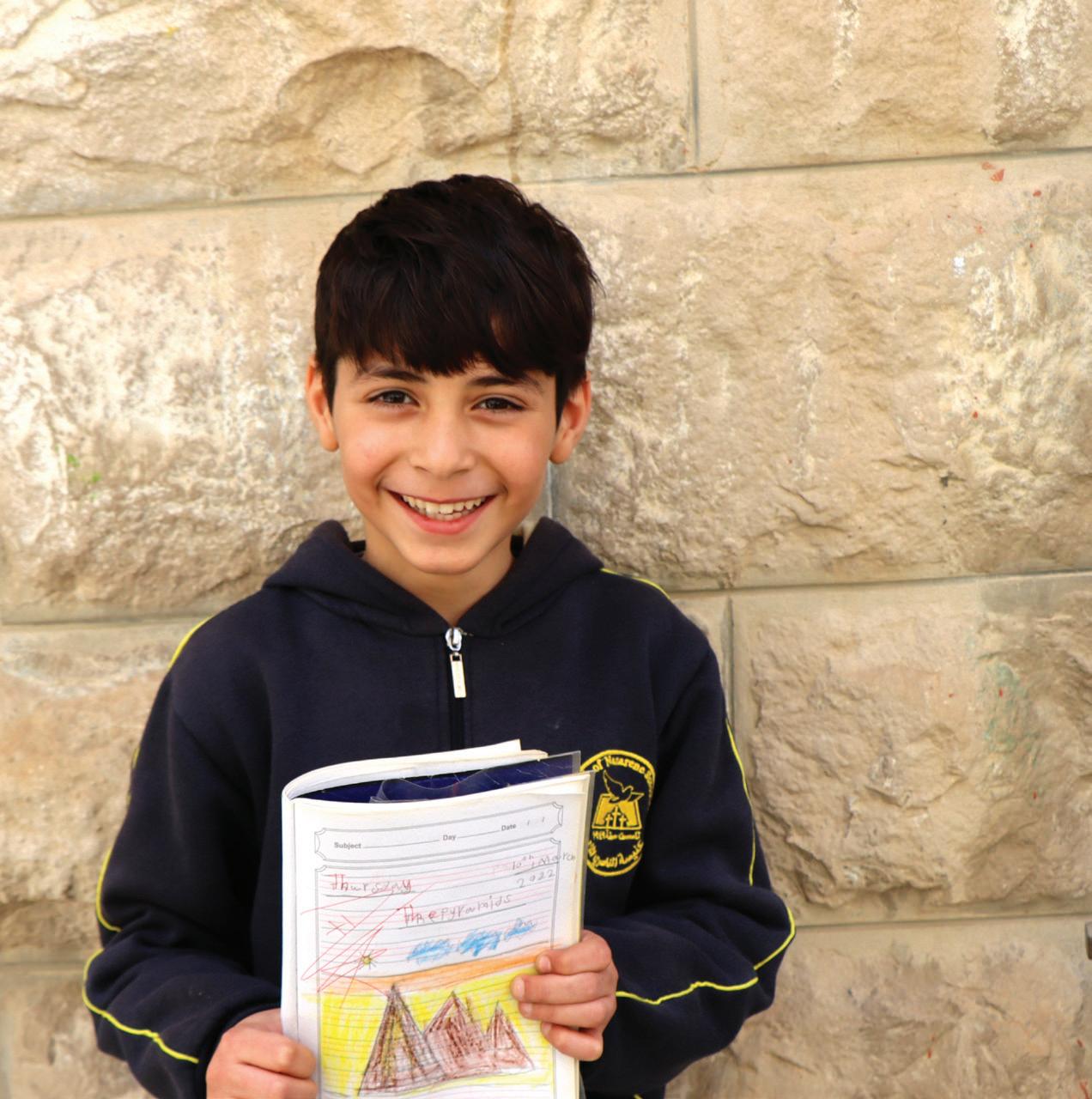

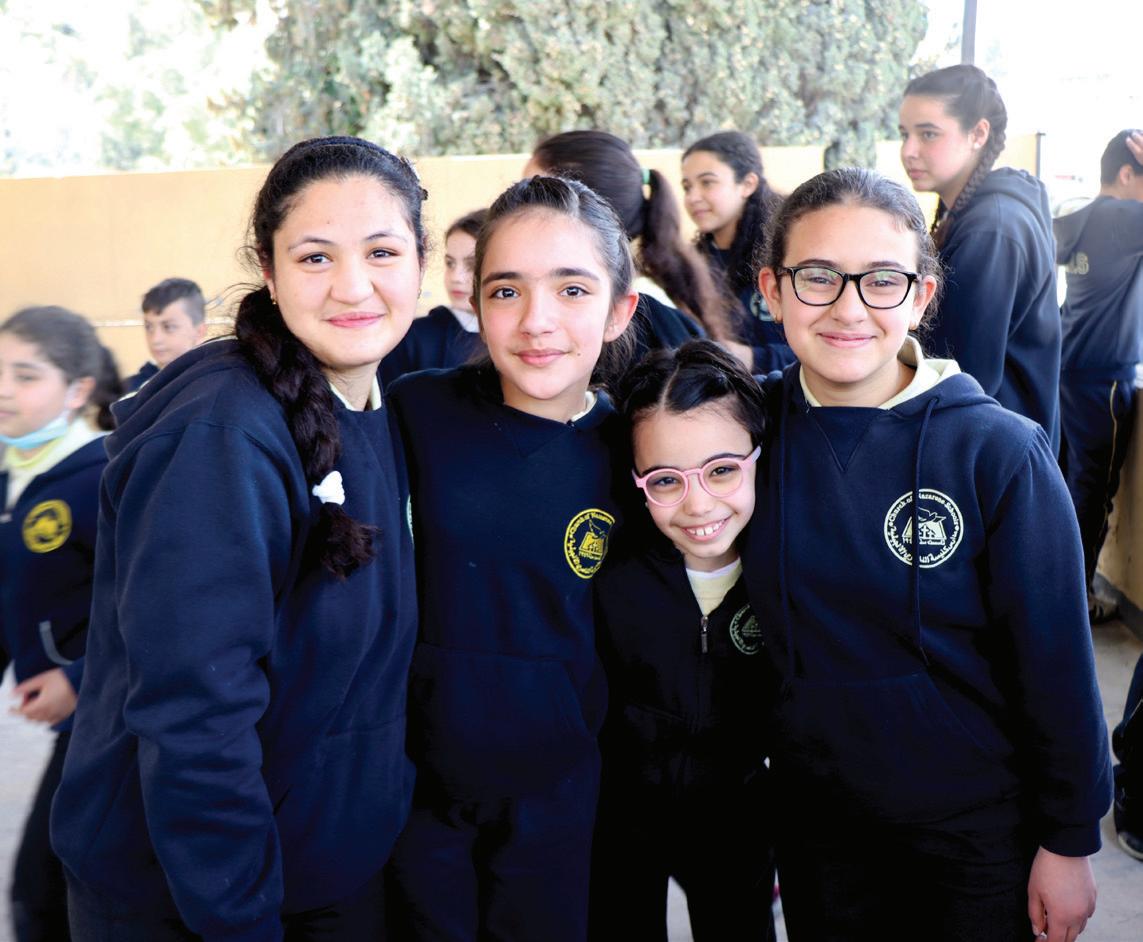 THE FIRST NAZARENE SCHOOL IN JORDAN OPENED NEARLY 70 YEARS AGO WITH THE MISSION TO SERVE COMPASSIONATELY.
TODAY, STUDENTS FROM AT LEAST SEVEN COUNTRIES ATTEND TWO SCHOOLS.
SAMI LIKES TO DRAW—IN A RECENT ENGLISH LESSON, HE LEARNED ABOUT THE PYRAMIDS AND ANCIENT EGYPTIANS.
THE FIRST NAZARENE SCHOOL IN JORDAN OPENED NEARLY 70 YEARS AGO WITH THE MISSION TO SERVE COMPASSIONATELY.
TODAY, STUDENTS FROM AT LEAST SEVEN COUNTRIES ATTEND TWO SCHOOLS.
SAMI LIKES TO DRAW—IN A RECENT ENGLISH LESSON, HE LEARNED ABOUT THE PYRAMIDS AND ANCIENT EGYPTIANS.
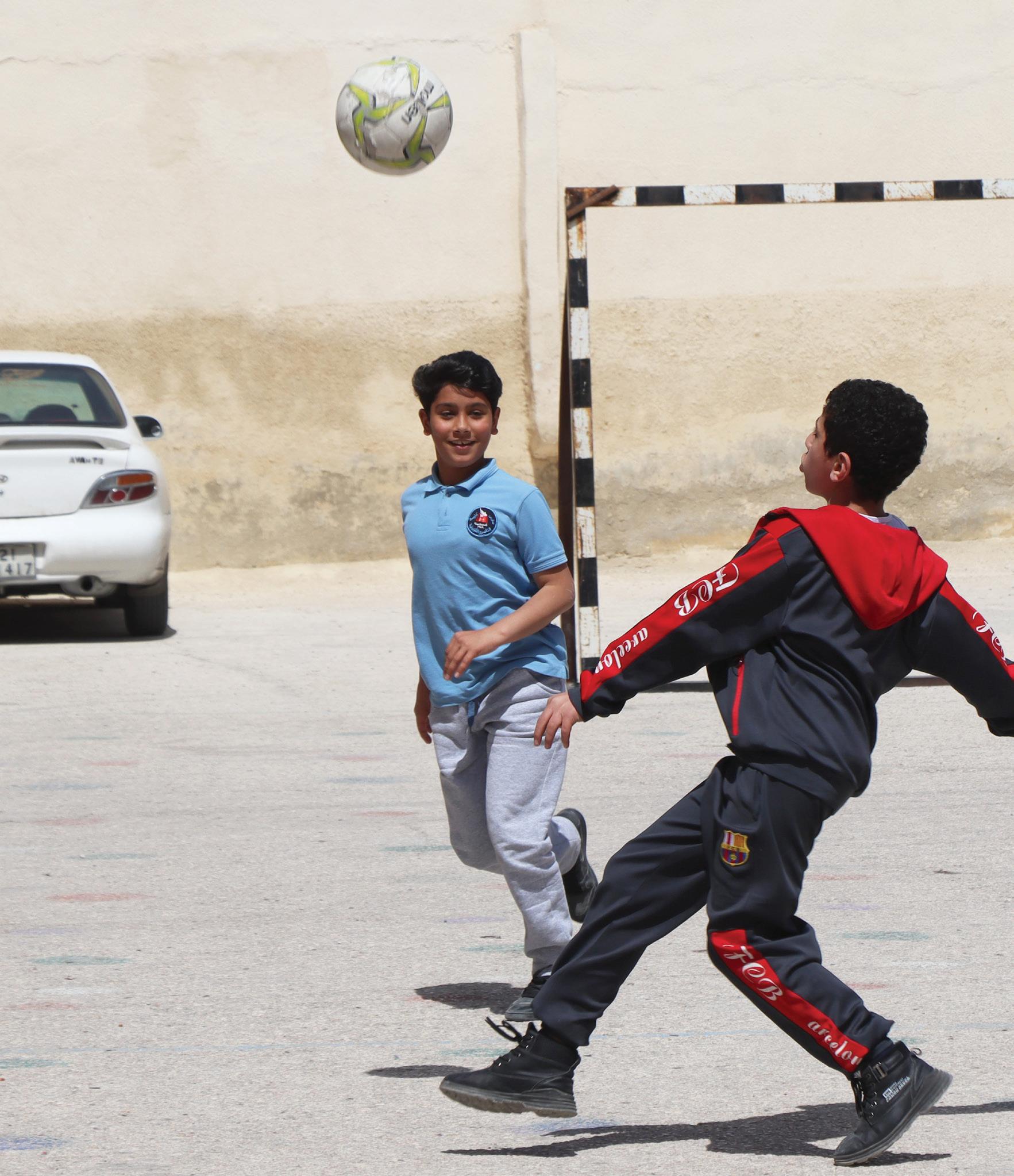




22 2022 // ISSUE 2 22 2022 // ISSUE 2
EXPERIENCED SEVERE
INFORMED
AND SUPPORT.
SOME STUDENTS HAVE
TRAUMA—THE SCHOOLS PROVIDE
CARE
THE PANDEMIC WAS A PARTICULARLY DIFFICULT
TEACHERS
AS PART OF NAZARENE CHILD DEVELOPMENT PROGRAMS, THE SCHOOLS PRIORITIZE HOLISTIC CARE FOR CHILDREN.
“THE MOST IMPORTANT POINT IS THAT WE LOOK AFTER THE CHILDREN HERE," SAYS PRINCIPAL LAYLA.
TIME FOR
AND STUDENTS ALIKE.

23 NCM.ORG
YOU GIVE
FOR WHEN THEY NEED IT
compassionate action
the crisis or need. GIVE BY JANUARY 31 AT NCM.ORG/YEAREND
WILL
NOW
MOST? By giving to NCM’s Greater Compassion fund, you ensure
right away, no matter
ONe MERCY
STORIES OF BLANKETS, BIRDS, BUSINESS LOANS, AND THE EGYPTIAN NAZARENE BEHIND IT ALL
 BY JOANNA NASRALLAH AND NABIL HABIBY PHOTOS COURTESY OF STEVE JETER AND MARYAM
BY JOANNA NASRALLAH AND NABIL HABIBY PHOTOS COURTESY OF STEVE JETER AND MARYAM
Fifteen people gather together in a small apartment in Egypt. Theresa has brought along some blankets, curtains, and crochet embroidery—all things she has made for her small business. She had sat in this very chair a year ago. Before then, she used to come here only to attend prayer meetings. The place is called “The Nazarene Institute for Care and Development.”
In 2008, Pastor Ayman and his wife, Maryam, were sent by a Nazarene in Jordan to start a Nazarene work in this part of Egypt. The new church met in their house from 2008 all the way to 2016. Then, as the numbers increased, they would meet in public gardens. Finally, the church rented the apartment for ministry.
A CHURCH IN ACTION
When Theresa first heard about the church, she thought of it as a place for Christian fellowship. Then Pastor Ayman and Maryam told her about the Small Business Fund; if she was interested, a partner organization could give her a modest loan to start a small business. She would repay the loan over time without any interest.
Theresa had eagerly accepted the offer. She had always dreamed of owning a sewing machine so she could make ends meet. She took the loan and bought with it a machine, fabric, thread, and other necessary material. She now has a thriving shop selling blankets, curtains, crochet embroidery, and when possible, used furniture. Her favorite verse is
Psalm 91:14: “Because you are devoted to me, I’ll rescue you. I’ll protect you because you know my name” (CEB).
“The church told me clearly that this ministry is not just about the money,” she explains. “It is to encourage you to hold on to God. The same place that supports me spiritually also supports me financially.”
This is how she found herself, one year later, sitting in a meeting Pastor Ayman holds every few months to introduce people who had benefitted from a loan to people thinking about getting a loan.
STORIES OF HOPE
So far, the church has helped 40 individuals find a new source of income through the small loans project. Sometimes, those at the institute have to spend out of pocket to cover administrative costs; Maryam says that the church is moved with a heart for the poor.
“Lots of individuals in our community struggle with divorce, poverty, and unemployment,” she explains. “Things got worse in COVID times. This is where the idea of giving small loans started.”
Pastor Ayman and Maryam study the applications, and if the proposed business meets the requirements, the
24 2022 // ISSUE 2
“THE REASONS ARE MANY, BUT MERCY IS ONE.”
project will provide the loan. Not all loan receivers attend the church. Some, like Theresa, hear about the fund in the fellowship of the church, while others who have never attended the church also benefit from the program. Theresa looks around the room and sees a number of familiar faces. Reem*, a widow, took a loan of around $250 and bought some potato chips and child napkins to sell in schools. Another widow started a sewing shop, which now employs other women and has even expanded into another city. They sit together and share notes.
Across the room sits Youssef*, a college student who took a loan and bought himself some chickens. He began to raise chickens and sell them in the market. His work took off, and he was soon paying his loan back by selling discounted meals to the church for its other

used her loan to pay her son’s college tuition rather than start a business. She explained her predicament to the church, and the church leadership understood her situation and forgave her.
“The reasons are many, but mercy is one,” Maryam says.
LOOKING TO THE FUTURE
Maryam feels great joy at being used by God to help people get their daily bread. She lists example after example with excitement. A woman sells perfume bottles, makes half a dollar and buys a falafel breakfast for her family.
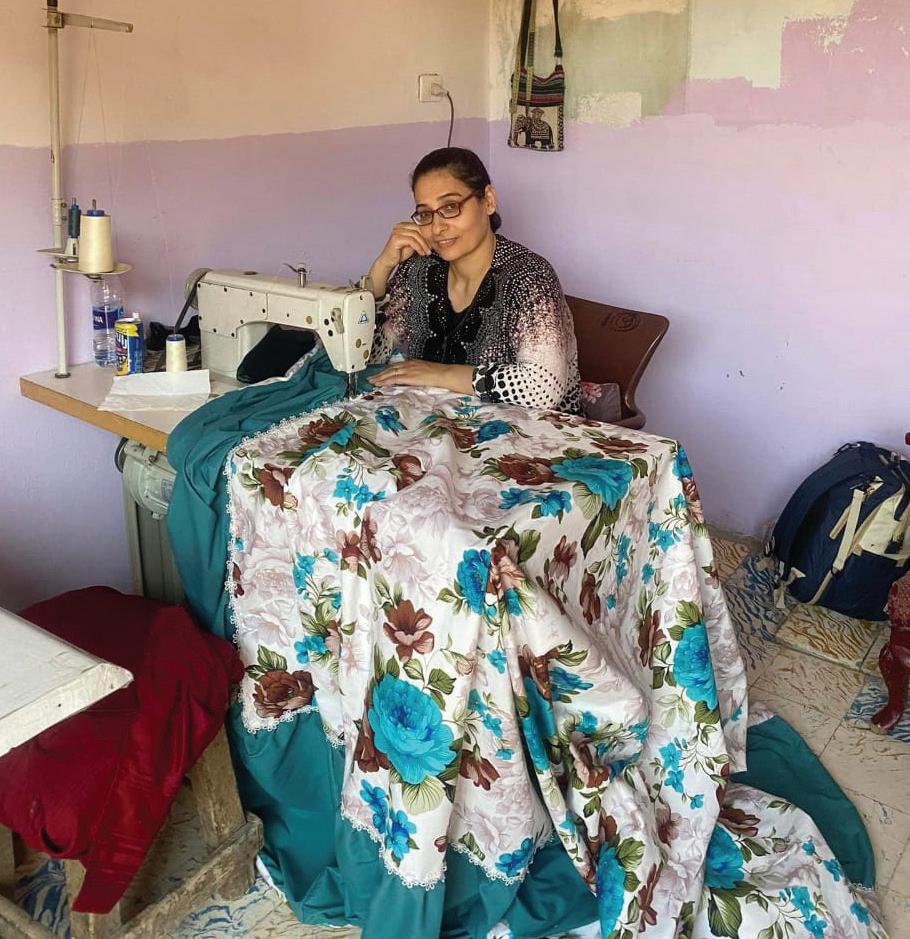
“It is such a good feeling to know that we are helping a family live with dignity,” Maryam shares. “We are truly standing with the families, and as the Letter of James puts it, we are not sending the needy away with a mere oral blessing.”
compassionate ministry engagements. As his project grew, it required more money, so he took more loans from the project. He has since repaid the entire amount and is now selling turkeys, which he raises on the roof of his house. Another man sits beside Youssef. Theresa does not know him well, for he doesn’t attend church. But she has seen him in these meetings. With his loan, he opened a small bookshop that sells books for school students. A few women chat together. They all took loans from the project to buy women’s accessories from a local vendor. They go around selling those and making a profit.
The list goes on. Naturally, not all of them succeed. Maryam tells us of one case where a woman
There are currently around 30 people on the waiting list of this project. Many are single women looking for ways to make ends meet for their children. As the project gets more funding, it can expand its reach. The church in this community continues to minister to the community in all possible ways.
The meeting is adjourned. Some items were sold. Theresa had the chance to tell her story. A number of prospective loan recipients listened and asked questions. Theresa leaves the small apartment and makes her way to her shop to put back the remaining embroidery and blankets. The church is called an institution for care and development. For some, it is a place of prayer. For others, it is a place of financial support. It is a place, as Theresa and many others have experienced, where you find sustenance for your soul and body. Many reasons. One mercy.
*Noted names are changed and surnames are redacted for safety.
“THE CHURCH TOLD ME CLEARLY THAT THIS MINISTRY IS NOT JUST ABOUT THE MONEY. IT IS TO ENCOURAGE YOU TO HOLD ON TO GOD.”
The church partners with community members to learn what the greatest needs are.
Local community members learn marketable skills at one Egyptian church.
WEAVING FAMILIES TOGETHER

MINISTRY
BY
The journey across the border between Guatemala and Mexico is too familiar to those who live nearby. In recent years, months, and weeks, the Church of the Nazarene has come across many caravans, encountering and working with people who have decided to travel north in search of a better economic life for their families.
The people in Chicajalaj, a village in Guatemala close to the border with Mexico, are no exception. There, the family size is large and multigenerational, averaging six to eight family members and three generations. The only type of work available is farming beans or corn and raising domestic animals, mostly chickens and pigs, to sell at the market for an income of about $5 per day. In order to make it through the months of October through January, when no crops grow well, many migrate across the border to Tapachula, Mexico, for the coffee harvest.
The familiar story of migration north, which is one of the only ways for these small communities to survive, recently ended in a tragedy that struck close to home for the Nazarene family. Pastor Moises and his community were devastated by the deaths of four men from the village. One, Marvin Tomas, was just 21 years old and already the sole provider for his family after the death of his father. Tomas worked in the fields during the week, and he attended a trade school on the weekends in hopes that once graduated, he would be able to make more than $5 per day.
In early 2021, Tomas and three other men from Chicajalaj, including Pastor Moises’ brother-in-law, decided to join a caravan heading north. The dangerous journey includes risks like heat exhaustion, drug cartels, coercion, and more. The men hoped to be able to make enough money to alleviate the financial pressure for their families. But on January 25, 2021, the people of Chicajalaj received the news that the van transporting the men had been set on fire by criminals
26 2022 // ISSUE 2
A
OF HOPE IS BORN OF A TRAGEDY IN GUATEMALA
Families are using wooden looms to create cloth they can sell.
DÁMARIS KELLOGG, NCM COORDINATOR NORTH CENTRAL FIELD
PHOTOS COURTESY OF NCM NORTH CENTRAL FIELD
demanding payments, killing everyone inside.
The tragedy instigated a change; people wanted a way to stay home and still earn money. How could we support these families so they didn’t have to be separated from their loved ones in search of a better life? Pastor Moises already had an answer.


Nazarene Compassionate Ministries sponsors the Vida Nueva (New Life) child development center from the Church of the Nazarene in Chicajalaj. Pastor Moises and his daughter Marlen, who assists with the center, explained that job skills training would give people a chance to sell in the market, creating an alternative to the dangerous route north.
“We would like to learn how to make our own fabric for our clothing and be able to sell it and earn more money for our families,” Pastor Moises explained.
Those of us who were developing the ministry had no idea what this kind of project might entail, but we have since learned about large, wooden looms and the best way to weave beautiful and sturdy fabric. That day, when Pastor Moises introduced the idea, we gathered behind the church building and prayed for God’s leading and provision over this new idea.
The Loom Project was born, supported through NCM, Newstart Church of the Nazarene in Ohio, and

the vision of those in Chicajalaj. Initially, families of the children who are part of the Vida Nueva child development center were invited to participate.
Pastor Moises oversaw the construction of 10 wooden looms, which were delivered to one family a piece, and hired someone to teach a member of each family how to use them to weave fabric. Soon, that fabric will be sold in the markets of the nearby city and beyond. The next phase will equip and train 15 more families. As they learn the business skills, each family will create better financial security that will allow them to all stay together.
“People don’t really want to be away from their loved ones, but the economic need is so vast that they don’t have a choice a lot of the time,” Pastor Moises explains.
Keeping families together goes beyond the financial need they have, though. Keeping families together also means that the children grow up with the love and involvement of both parents. It means healthy families and community.
27
“WE GATHERED BEHIND THE CHURCH BUILDING AND PRAYED FOR GOD’S LEADING AND PROVISION OVER THIS NEW IDEA.”
The project was born from families hoping to stay together and be economically stable.
Community members created the project after a tragic loss.
The ministry partners with families who also attend a Nazarene child development center.
MINISTRY IN THE UnKNOWN
BY SYLVIA CORTEZ
PHOTOS COURTESY OF SYLVIA CORTEZ AND HAYLEY TARRANT
When the war in Ukraine began, church communities scattered. Now, as the fighting drags on, the challenge is to minister in the midst of an uncertain future.

Iremember the day we left. I had 20 minutes to quickly pack a carry-on with essential daily clothes and my backpack with the most important things for my work and doctoral studies—laptop, chargers, and a handful of dissertation books. Looking around, I felt panicked. I’d always thought I would know what to grab in an emergency, but at that moment, my mind was blank. When my 20 minutes were up, I stood alone in my apartment and prayed aloud a prayer by St. Ignatius:
You have given all to me. To you, Lord, I return it. Everything is yours; do with it what you will. Give me only your love and your grace, that is enough for me.
I joined my husband and the others in the car, and we drove away from Kyiv, Ukraine, away from our beloved city and the only home we’d ever known together. I couldn’t believe I was a refugee. We knew where we would sleep that night, but we had no idea beyond that. We didn’t know how long the journey would be. We didn’t know where we would find shelter the following nights. We didn’t know there would be so many cars, checkpoints, and varying curfew times in different cities. We didn’t know one of our neighbors would get sick along the way. There were so many factors that would significantly slow down our travel. We had no idea our journey west would eventually take seven days. We were going without knowing anything about the future, least of all when we would be able to return to our beloved Kyiv.
28 2022 // ISSUE 2
REFLECTIONS ON BEING THE CHURCH IN THE MIDST OF THE WAR IN UKRAINE
In those days when we were traveling, we learned very quickly that we simply could not make plans for the next few hours, much less days. That sense of uncertainty has remained and, in many ways, altered the way we speak: If…when…Lord willing…hopefully.
These questions are ever-present in our minds. In the meantime, we wait, pray, and find ways to fuel any embers of hope for peace and the safe return to our homes. And while these adjustments seem immense—new culture, language, foods, rhythms—the fact that we are surrounded by a loving community helps us to move forward. But what to do in this liminal space once we are settled?
SERVING A SCATTERED PEOPLE
The difficulty of being able to plan anything in the future is one of the most striking features of being a refugee. There are so many unknowns.
How long will the war last?
Is this the best place for us to be?
How long will we be able to stay here in this new place?
To what extent should we settle, and will we make ends meet? Who can I trust?
Is it safe enough yet to return?
My husband and I are both ordained pastors, and we’ve learned over the years that there is never a shortage of ministry opportunities. The reality of war and the thousands fleeing as a result meant that we quickly became shepherds of a scattered church. Half of the members of Kyiv First Church of the Nazarene stayed either in Kyiv or throughout Ukraine. The other half sought safety in Western Europe. The war quickly affected our daily routines and our senses of vocation.
How does one minister to a scattered church? How does war change the pastoral landscape? These days we are learning to live into the answers to these questions daily.

29 NCM.ORG
Isaiah 30:21 - Whether you turn to the right or to the left, your ears will hear a voice behind you, saying, “This is the way; walk in it.”
Ministries have risen up to provide support for those fleeing conflict.
In the early days of the war, as people were deciding whether to stay or leave Ukraine, Vasyl Ostryi, a pastor from Irpin Bible Church, wrote on the Gospel Coalition blog: How should the church respond when there is a growing threat of war? When there is constant fear in society? I’m convinced that if the church is not relevant at a time of crisis, then it is not relevant in a time of peace. Later, when Irpin became known worldwide as a place where unspeakable horrors and brutal killings occurred during this war, people there were asked to put that belief into practice in ways they never imagined.
But opportunities to serve, of course, are not just relegated to those living in war zones. The war in Ukraine has resulted in approximately 7.7 million internally displaced persons, and an additional 9.8 million have fled as refugees to another country. Those figures are daunting. It’s even more daunting to imagine those millions needing to settle somewhere for an unknown amount of time, not to mention the type of emotional, spiritual, and psychological care needed to sustain them. This is exactly where the church can step in to help.
A CAFÉ FOR WELCOMING
By the time we arrived in Poland, the Church of the Nazarene was busy establishing a response team at the border to assist refugees flooding into Western Europe. In Poznan, Poland, where we eventually settled, the church was also transforming the Sweet Surrender cafe into a Ukrainian community center.
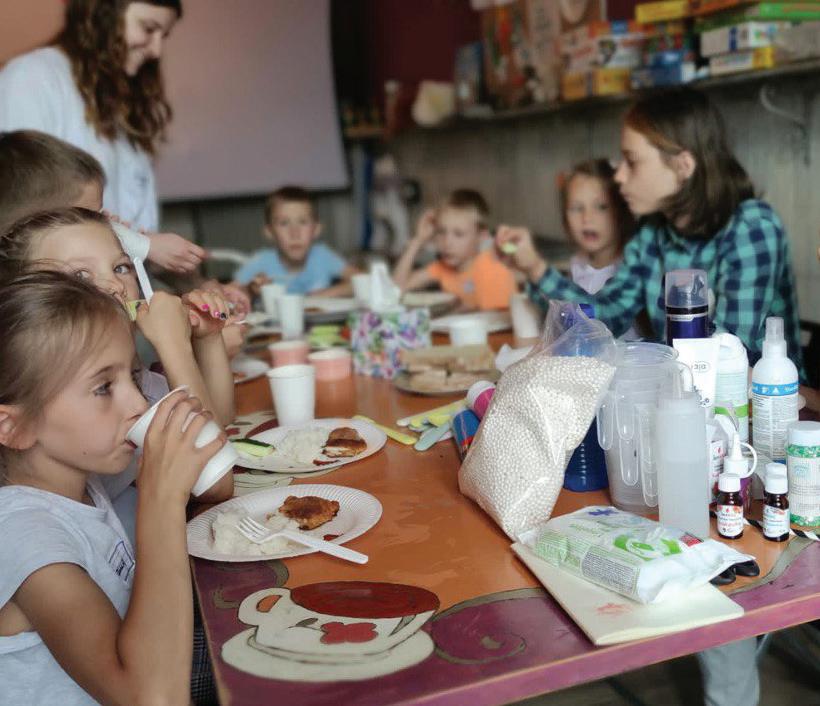
Hayley Tarrant, the director of this project, describes the mission of this work: “To provide relief to Ukrainians who have fled the invasion of the country and settled in Poznan by providing compassionate care, meaningful community, and integrative and experiential opportunities until the crisis has ended or the need is no longer evident.”
Hayley and the team of volunteers and paid Nazarene Compassionate Ministries staff are working hard to meet the ongoing challenging needs of refugees.
Early on, while we were still trying to shake off the trauma of sirens and shocking news stories, it was important to discern how my husband and I would serve. Almost immediately, we began receiving requests to go and serve in different areas. The influx of refugees meant that dozens of families were without a church.
Communities welcoming Ukrainian refugees desperately needed translators and pastors to partner with them. The opportunities to serve elsewhere were numerous and immense. And opportunities to serve in Poland were growing.
As we prayed and reflected, we became acutely aware of all that we were experiencing as refugees. Part of the discernment process revealed that it was important we not jump into new work immediately. After all, we still had our normal responsibilities and work. We had a congregation we
were still caring for and meeting with, and we had become full-time caretakers for my mother-in-law. Taking on a new congregation would not have been feasible or wise.
This is why, as a refugee, I am grateful for a church that has come alongside us and the large community of refugees here in Poland. By providing a safe space where Ukrainian refugees can gather, Sweet Surrender has quickly become a place that feels like a home away from home. The cafe’s team, almost half of whom are not refugees, offer numerous opportunities throughout the week for people to grow and connect, including a children’s program, Polish and English lessons, conversational clubs, special
30 2022 // ISSUE 2
A Kid's Club gives kids a place to play and learn.
“IF THE CHURCH DOES NOT KNOW HOW TO MINISTER DURING TIMES OF CRISIS, SHE WILL NOT KNOW HOW TO MINISTER DURING TIMES OF PEACE.”
outings, a weekly women’s tea gathering, and more recently, art therapy and trauma counseling opportunities. There is always so much happening that it’s easy for my husband and me to be both participants and a pastoral presence in those spaces where people gather.

LOVING IN LIMINALITY
As time passes, it has also become more evident that war has not only uprooted families from their homes but also disrupted plans, relationships, and marriages. We are learning to be present and to listen to any neighbor the Lord places in our path as we continually hear stories of brokenness resulting from this war.
To rephrase Pastor Ostriy’s words—if the church does not know how to minister during times of crisis, she will not know how to minister during times of peace.
The church is being called to face and meet the real needs of people who cannot hide their vulnerability. As refugees, we have been recipients of the church’s love and care. As pastors, we are learning to minister during this temporary time and space—to share that same love and care.
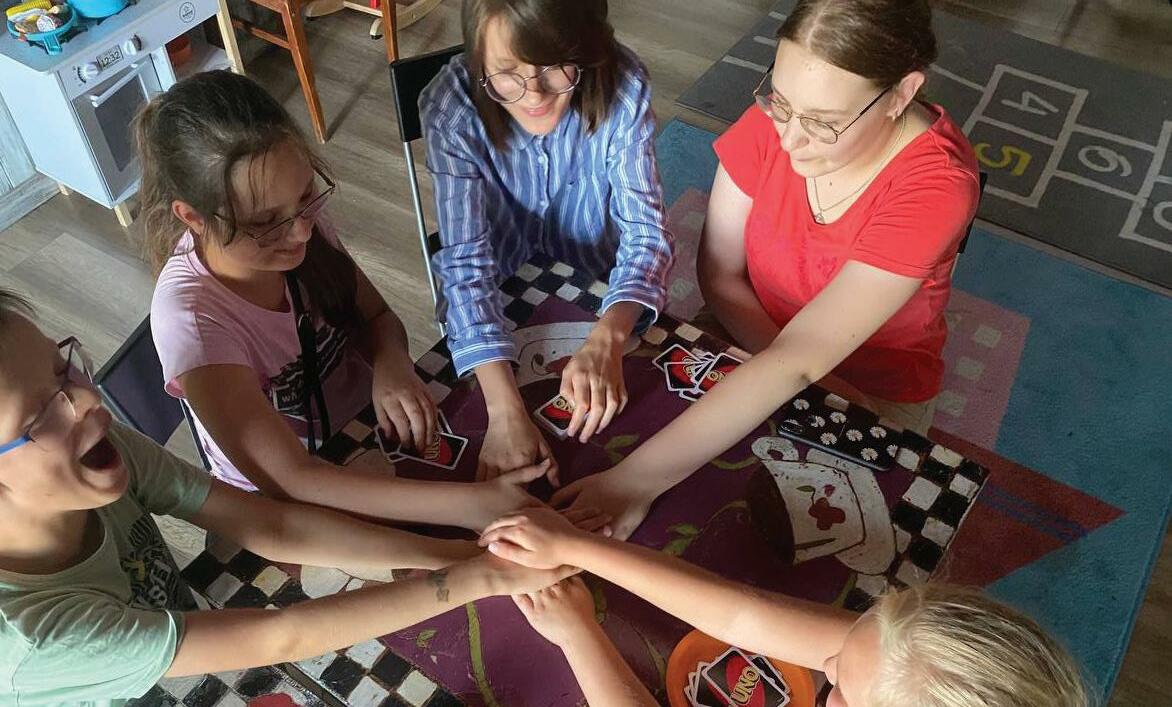

We are so grateful to those who remained in Ukraine and continue to guide the church. We have had to lean on them to care for the church there while we care for those outside of Ukraine. And we are equally grateful for partners outside Ukraine who are learning to minister to refugees during this time of crisis. Together we are all learning to listen to God’s voice and care for those that God has placed in our midst for however long they remain.
The work of learning to minister to a scattered church remains. And we are all still in the midst of dealing with the trauma of this war. We don’t know what tomorrow will bring. We long to be home. But God is teaching us to be ministers where He has placed us temporarily. We don’t know why this war continues to rage, but we cling to a God who is near, who knows suffering, and who lives out a message of hope and resurrection within and through us.
Some of this article has been adapted from the author’s online reflections in the midst of the journey.
31 NCM.ORG
Language classes—a Polish class is pictured—can create community.
Children's programs can help kids build friendships.
The cafe team in Poland has adapted to the often-changing needs.
VOICES
RENEWS & GENERATES


God does not just mend, repair, and restore; God renews and generates, transcending our expectations of even what we desire, beyond what we dare to ask for or imagine. In a stunning way, Bishop Wright expands on this theologically:
What you do in the Lord is not in vain. You are not oiling the wheels of a machine that’s about to roll over a cliff. You are not restoring a great painting that’s shortly going to be thrown on the fire. You are not planting roses in a garden that’s about to be dug up for a building site. You are— strange though it may seem, almost as hard to believe as the resurrection itself— accomplishing something that will become in due course part of God’s new world.
The greatest miracle of the resurrection of Christ is not just the body of Jesus taking on a new, multidimensional, transformed DNA; the greatest miracle is the fact that the miracle itself reveals the expansiveness of God and the potential for a greater and deeper miracle that surpasses our imaginative capacities. By definition, God’s miracle breaks nature wide open, and such an act is the ultimate transgression in love by God toward God’s own Creation. The true gift, if fully understood and embraced, will transform us from within and make us beings of hope.
32 2022 // ISSUE 2
Excerpt from Art and Faith: A Theology of Making by Makoto Fujimura
Go Deeper
READ
In The Beauty Chasers: Recapturing the Wonder of the Divine , Timothy Willard asks if we can reclaim lives of wonder. The book encourages readers to see the world with new eyes by slowing down and finding beauty. Willard weaves stories together to show that, "Beauty can change you if you let it.”
STUDY
The Live Justly study is based in Scripture and practical action, considering both in six areas: advocacy, prayer, consumption, generosity, creation care, and relationships. The study comes in the form of a book and accompanies a ten-part video series, which can be used as a Bible study or to inform small-group discussions.




WATCH
Participate in visual liturgies through The Work of The People , a collective of people and films creating a space to explore humanity and divinity. Explore an extensive library of “visual poetry, prayer, blessing, interpretive, and contemplative pieces” to help guide and frame spiritual contemplation and mediation. Available through theworkofthepeople.com .
LISTEN
Listen to Oklahoma City First Church of the Nazarene pastors Jon Middendorf and Zach Lucero consider difficult questions about faith and the church in the Unafraid podcast. Interviews about different walks with Christ run the gamut, from activist Shane Claiborne to U.S. senators. Available on anchor.fm

Snapshot
what’s broken is a distinctly biblical concept, which is why as people of faith we should be leading the way into redemption, restoration, and reconciliation.”
- Latasha Morrison
To read about how survivors of human trafficking are finding hope in the DRC, turn to page 12.
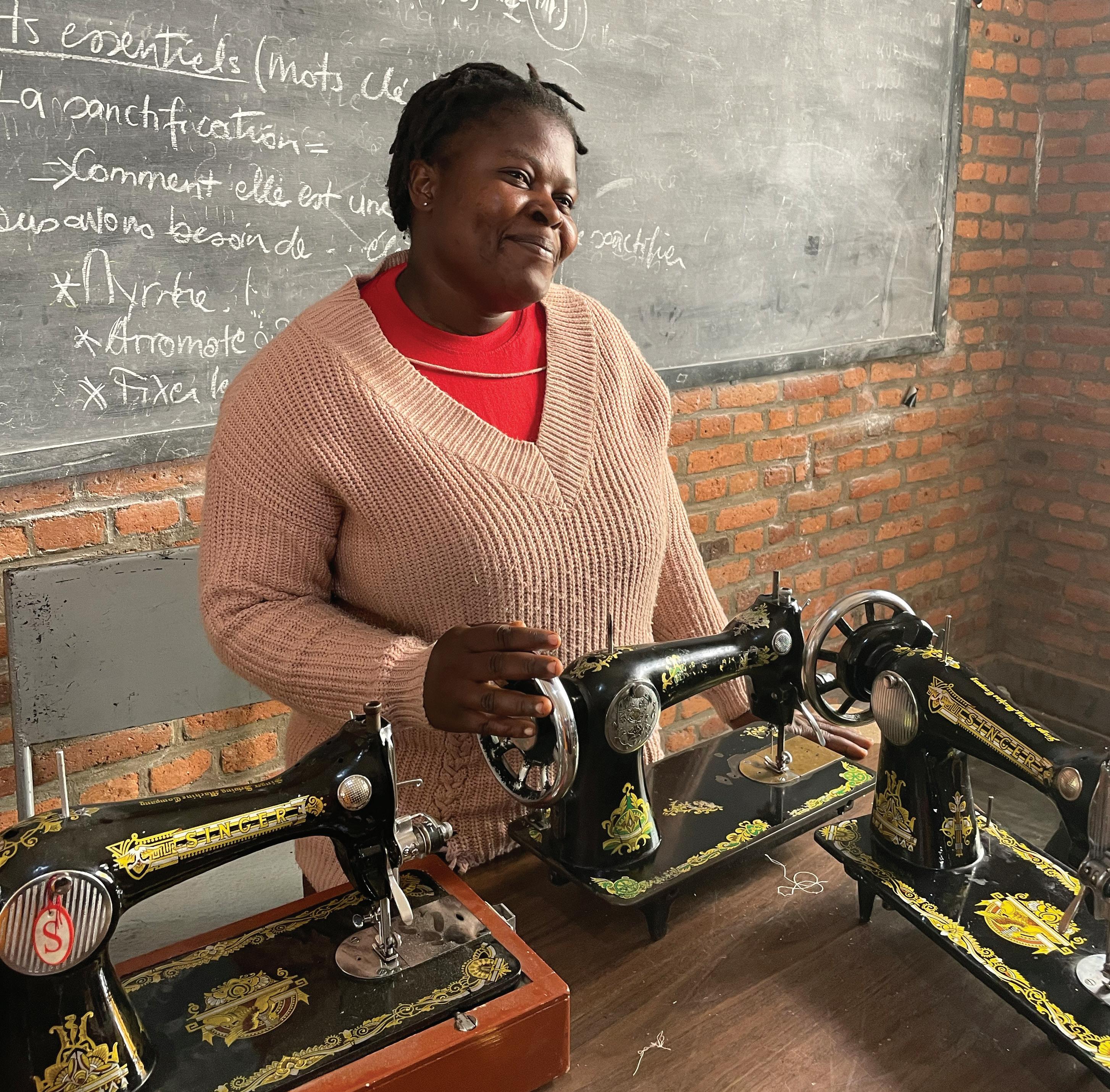
34 2022 // ISSUE 2
“Repairing

35 NCM.ORG WWW.NAZARENEFOUNDATION.ORG For more information about signing up to become a sponsor, visit NCM.ORG/SPONSOR NAZARENE COMPASSIONATE MINISTRIES I would like to sponsor a child for $30 a month: l Yes I would like to sponsor: l Greatest Need l Boy l Girl I would like to sponsor a child from: l Greatest Need l Africa l Asia l Asia-Pacific l Caribbean l Eastern Europe l Latin America l Middle East Name / Group Contact Person (if different) Address / City / State / ZIP Phone ________________________________________ Email Church to receive 10% giving credit You can mail this form to: Nazarene Compassionate Ministries, Child Sponsorship 17001 Prairie Star Parkway, Lenexa, Kansas 66220 No payment is due now. You will receive information by mail about your sponsored child and payment options. You can give a gift of hope this Christmas. Sponsor a child today.
NAZARENE COMPASSIONATE MINISTRIES

Church of the Nazarene
17001 Prairie Star Pkwy Lenexa, KS 66220 (800) 310-6362 info@ncm.org
Join those living out Christ’s love in Beirut through the NCM Christmas Project.


PAID
GIVE TODAY AT NCM.ORG/CHRISTMAS
Nonprofit Org. U.S. Postage
General Board of the Church of the Nazarene









 By Roni Gunawan, NCM Coordinator Sealands Photos courtesy of NCM Sealands
By Roni Gunawan, NCM Coordinator Sealands Photos courtesy of NCM Sealands


 Reporting by Moses Sikabeta, NCM in Zambia Photos courtesy of Moses Sikabeta
Reporting by Moses Sikabeta, NCM in Zambia Photos courtesy of Moses Sikabeta





 By Denise and Phil Anderson, Cactus Nazarene Ministry Center Photos courtesy of Cactus Nazarene Ministries
By Denise and Phil Anderson, Cactus Nazarene Ministry Center Photos courtesy of Cactus Nazarene Ministries





 - Didas
- Didas


 BY GINA POTTENGER PHOTOS BY LAUREN SNODGRASS
BY GINA POTTENGER PHOTOS BY LAUREN SNODGRASS

















 THE FIRST NAZARENE SCHOOL IN JORDAN OPENED NEARLY 70 YEARS AGO WITH THE MISSION TO SERVE COMPASSIONATELY.
TODAY, STUDENTS FROM AT LEAST SEVEN COUNTRIES ATTEND TWO SCHOOLS.
SAMI LIKES TO DRAW—IN A RECENT ENGLISH LESSON, HE LEARNED ABOUT THE PYRAMIDS AND ANCIENT EGYPTIANS.
THE FIRST NAZARENE SCHOOL IN JORDAN OPENED NEARLY 70 YEARS AGO WITH THE MISSION TO SERVE COMPASSIONATELY.
TODAY, STUDENTS FROM AT LEAST SEVEN COUNTRIES ATTEND TWO SCHOOLS.
SAMI LIKES TO DRAW—IN A RECENT ENGLISH LESSON, HE LEARNED ABOUT THE PYRAMIDS AND ANCIENT EGYPTIANS.






 BY JOANNA NASRALLAH AND NABIL HABIBY PHOTOS COURTESY OF STEVE JETER AND MARYAM
BY JOANNA NASRALLAH AND NABIL HABIBY PHOTOS COURTESY OF STEVE JETER AND MARYAM























